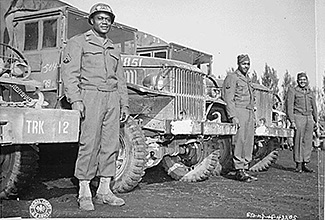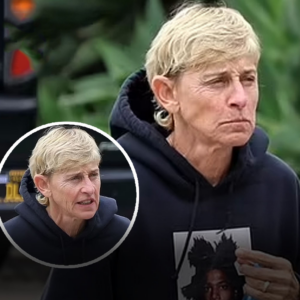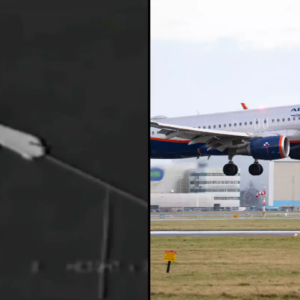Enlarge
Original Caption: “These drivers of the 666th Quartermaster Truck Company, 82nd Airborne Division, who chalked up 20,000 miles each without an accident, since arriving in the European Theater of Operations.” Local Identifier: 208-AA-32P-3, National Archives Identifier: 535533.
View in National Archives Catalog
World War II began over 80 years ago and as we continue to honor those Americans who undoubtedly and courageously contributed to the defense of our nation, we often overlook in our remembrances the valiant efforts of African Americans. Throughout the war years they repeatedly had to battle adversaries on two fronts: the enemy overseas and racism at home. African-Americans recognized the paradox of fighting a world war for the “four freedoms” while being subjected to prejudicial practices in the United States. Thus, as the war unfolded, they vehemently insisted on the privileges of full citizenship. African-Americans were ready to work and fight for their country, but at the same time they demanded an end to the discrimination against them.
To that end, over 2.5 million African-American men registered for the draft, and black women volunteered in large numbers. While serving in the Army, Army Air Forces, Navy, Marine Corps, and Coast Guard, they experienced continuing discrimination and segregation. Despite these impediments, many African-American men and women met the challenge and persevered. They served with distinction, made valuable contributions to the war effort, and earned well-deserved praise and commendations for their struggles and sacrifices.
On the homefront, African-Americans also did their part to support the war. They worked in war industries and in government wartime agencies, sold war bonds, voluntarily conserved goods needed for the war, performed civil defense duties, encouraged troops by touring camps as entertainers, risked their lives on the front lines to report the war, and performed many other vital services.
The images described on this page illustrate African-American participation in World War II. The pictures were selected from the holdings of the Still Picture Branch (RRSS) of the National Archives and Records Administration. The majority of the pictures were chosen from the records of the Army Signal Corps (Record Group 111), Department of the Navy (Record Group 80), Coast Guard (Record Group 26), Marine Corps (Record Group 127) and the Office of War Information (Record Group 208).
The pictures are first grouped by the five military branches and then by subject headings entitled Merchant Marine, Women in the Military, Training, Rest and Relaxation, Personalities, and the Homefront.
Whenever possible, original captions are used and appear in quotation marks; however, no attempt was made to verify completely the accuracy of all the information included in these captions. Obvious errors and misspellings were corrected, but no effort was made to standardize identification of military ranks, which were cited by photographers in various ways. The captions also reflect the fact that the Women’s Auxiliary Army Corps (WAAC) was renamed the Women’s Army Corps (WAC) in July 1943, and the Air Corps (AC), after a reorganization, became the Army Air Forces (AAF) in March 1942.
Many of the captions were edited for length, and extraneous information and pejorative terms were eliminated. Conversely, information was sometimes added to help the reader understand a caption. Within an original caption, this additional material appears in brackets. When no caption was available, one was created. If the photographers, artists, locations, or dates of the photograph were known, they also are listed. Following all of this information in the caption are local identification numbers followed by a link to the National Archives Identifier (NAID), which will direct you to the photo’s digitized file via NARA’s online catalog. The selected photographs are in the public domain.
Barbara Lewis Burger researched, selected, and arranged the items for this list and wrote the introductory information in 1993. Additional updates to this introduction were made as recently as May 2021.
Some of the terms used at the time may now be considered to be outdated, inaccurate, derogatory, disrespectful, or culturally insensitive. NARA does not alter, edit, or modify original captions, as they are part of the historical record and reflect and document the standard language, attitudes, and biases at the time.
US Army
1. “On parade, the 41st Engineers at Ft. Bragg, NC in color guard ceremony.” N.D. National Archives Identifier: 535822, Local Identifier: 208-NP-4HHH-2
2. “An MP on motorcycle stands ready to answer all calls around his area. Columbus, Georgia.” April 13, 1942. Pfc. Victor Tampone. National Archives Identifier: 531136, Local Identifier: 111-SC-134951.
3. “A company of men has set up its office between the columns (Doric) of an ancient Greek temple of Neptune, built about 700 B.C.” At desk, front to rear: Sgts. James Shellman, Gilbert A. Terry, John W. Phoenix, Curtis A. Richardson, and Leslie B. Wood. In front of desk, front to rear: T/Sgt. Gordon A. Scott, M/Sgt. Walter C. Jackson, Sgt. David D. Jones, and WO Carlyle M. Tucker. Italy. September 22, 1943. National Archives Identifier: 531170, Local Identifier: 111-SC-181588.
4. “Three soldiers of the United States Army sit in place at a radar used by the 90th Coast Artillery in Casablanca, French Morocco.” June 19, 1943. National Archives Identifier: 531325, Local Identifier: 111-SC-223413.
5. “A kitchen was set up along the beach for the…labor battalion unloading the boats. This picture shows a couple of the men enjoying a hot meal for a change. Massacre Bay, Attu, Aleutian Islands.” May 20, 1943. T/5 Vincent A. Wallace. National Archives Identifier: 531159, Local Identifier: 111-SC-174129.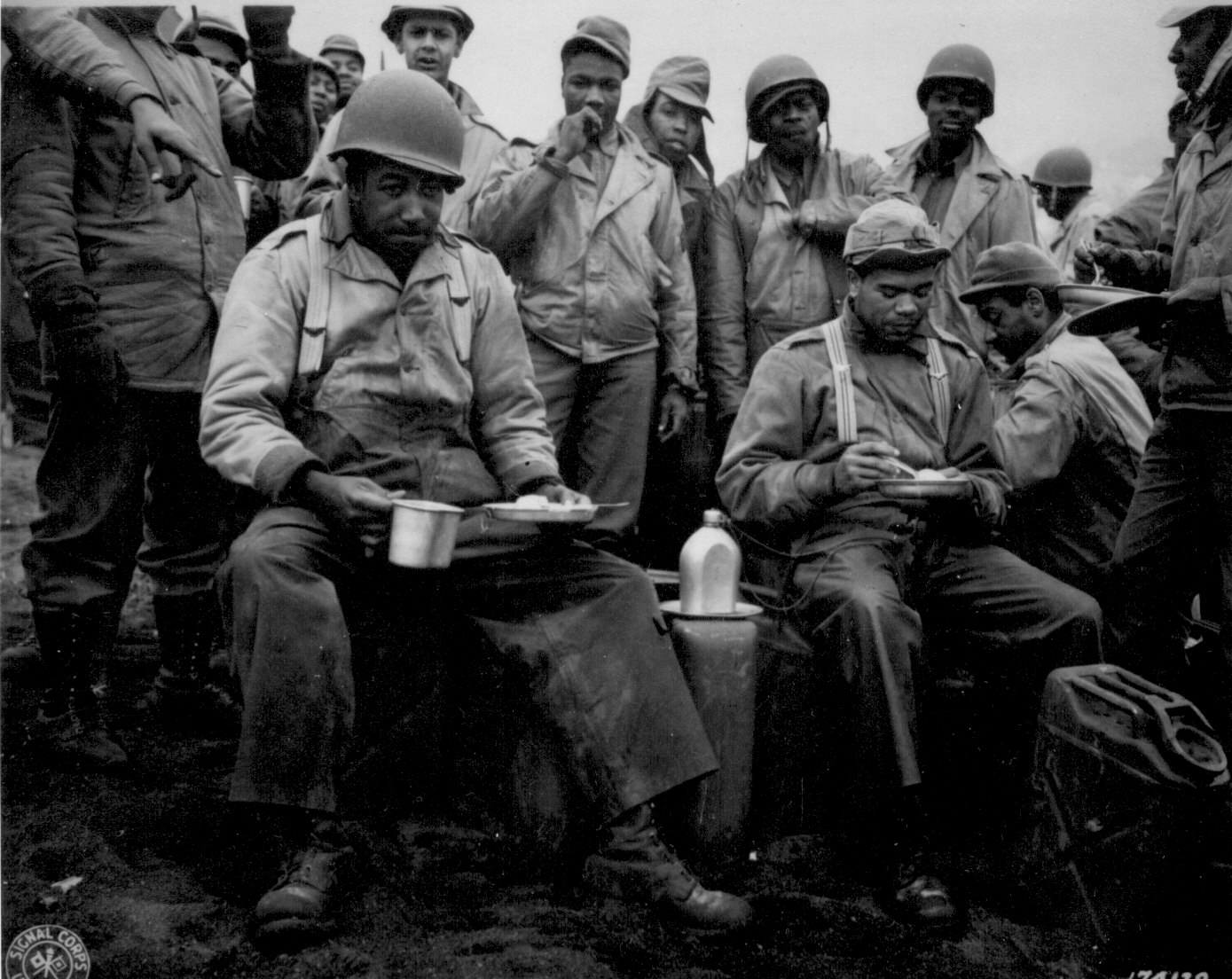
Enlarge
Original Caption: “A kitchen was set up along the beach for the…labor battalion unloading the boats. This picture shows a couple of the men enjoying a hot meal for a change. Massacre Bay, Attu, Aleutian Islands.” Local Identifier: 111-SC-174129, National Archives Identifier: 531159.
View in National Archives Catalog
6. “Negro soldiers draw rations at the camp cook house at their station in Northern Ireland. Detachments of Negro troops were among the latest arrivals with the American forces in Northern Ireland.” Ca. August 1942. Acme. National Archives Identifier: 535544, Local Identifier: 208-AA-46G-1.
7. “… American Army Engineer task force in Liberia find themselves in a land from which their ancestors came. Wash day and Pvt. Jack David scrubs out his things on top of a table made from native trees.” Ca. July 1942. Fred Morgan. National Archives Identifier: 531144, Local Identifier: 111-SC-150980-B.
8. “Negro members of the 477th Antiaircraft Artillery, Air Warning Battalion, study maps in the operations section at Oro Bay, New Guinea.” November 15, 1944. Pvt. Edward Grefe. National Archives Identifier: 531348, Local Identifier: 111-SC-305909.
9. “U.S.-built Army trucks wind along the side of the mountain over the Ledo supply road now open from India into Burma…” n.d. National Archives Identifier: 535540, Local Identifier: 208-AA-45L-1.
10. “A U.S. Army soldier and a Chinese soldier place the flag of their ally on the front of their jeep just before the first truck convoy in almost three years crossed the China border en route from Ledo, India, to Kunming, China, over the Stilwell road.” February 6, 1945. Sgt. John Gutman. National Archives Identifier: 535573, Local Identifier: 208-AA-338A-1.
11. “Two soldiers gather up their baggage as transportation arrives to take them to their outfit on Guam. Another soldier sits disconsolately awaiting further orders of transportation.” August 4, 1945. National Archives Identifier: 535552, Local Identifier: 208-AA-63HH-1.
12. “… troops in Burma stop work briefly to read President Truman’s Proclamation of Victory in Europe.” May 9, 1945. S/Sgt. Yarnell. National Archives Identifier: 531341, Local Identifier: 111-SC-262229.
13. “Seeking to rescue a Marine who was drowning in the surf at Iwo Jima, this sextet of Negro soldiers narrowly missed death themselves when their amphibian truck was swamped by heavy seas. From left to right, back row, they are T/5 L. C. Carter, Jr., Private John Bonner, Jr., Staff Sergeant Charles R. Johnson. Standing, from left to right, are T/5 A. B. Randle, T/5 Homer H. Gaines, and Private Willie Tellie.” March 11, 1945. S/Sgt. W. H. Feen. National Archives Identifier: 532547, Local Identifier: 127-N-114329.
14. “Negro troops of the 24th Infantry, attached to the Americal Division, wait to advance behind a tank assault on the Jap[anese], along Empress Augusta Bay on Bougainville.” 1944. National Archives Identifier: 531254, Local Identifier: 111-SC-202491.
15. “Sgt. John C. Clark…and S/Sgt. Ford M. Shaw…(left to right) clean their rifles in bivouac area alongside the East West Trail, Bougainville. They are members of Co. E, 25th Combat Team, 93rd Division…” April 4, 1944. Lt. Schuman. National Archives Identifier: 531404, Local Identifier: 111-SC-364565.
16. “Cautiously advancing through the jungle, while on patrol in Japanese territory off the Numa-Numa Trail, this member of the 93rd Infantry Division is among the first Negro foot soldiers to go into action in the South Pacific theater.” May 1, 1944. National Archives Identifier: 531184, Local Identifier: 111-SC-189381-S.
17. “Lt. Gen. George S. Patton, U.S. Third Army commander, pins the Silver Star on Private Ernest A. Jenkins of New York City for his conspicuous gallantry in the liberation of Chateaudun, France…” October 13, 1944. National Archives Identifier: 535724, Local Identifier: 208-FS-3489-2.
18. “Pvt. Jonathan Hoag,…of a chemical battalion, is awarded the Croix de Guerre by General Alphonse Juin, Commanding General of the F.E.C., for courage shown in treating wounded, even though he, himself, was wounded. Pozzuoli area, Italy.” March 21, 1944. Rutberg. National Archives Identifier: 531182, Local Identifier: 111-SC-188939.
19. “These drivers of the 666th Quartermaster Truck Company, 82nd Airborne Division, who chalked up 20,000 miles each without an accident, since arriving in the European Theater of Operations.” Left to right: T/5 Sherman Hughes, T/5 Hudson Murphy, Pfc. Zacariah Gibbs. Ca. May 1945. National Archives Identifier: 535533, Local Identifier: 208-AA-32P-3.
20. “Lt. Gen. Joseph T. McNarney, Deputy Supreme Allied Commander, Mediterranean Theater, inspects Honor Guard of MPs during his tour of the Fifth Army front at the 92nd Division Sector.” January 4, 1945. Yaskell. National Archives Identifier: 531415, Local Identifier: 111-SC-380271.
21. “Easter morning, T/5 William E. Thomas…and Pfc. Joseph Jackson…will roll specially prepared eggs on Hitler’s lawn.” March 10, 1945. 1st Lt. John D. Moore. National Archives Identifier: 531253, Local Identifier: 111-SC-202330.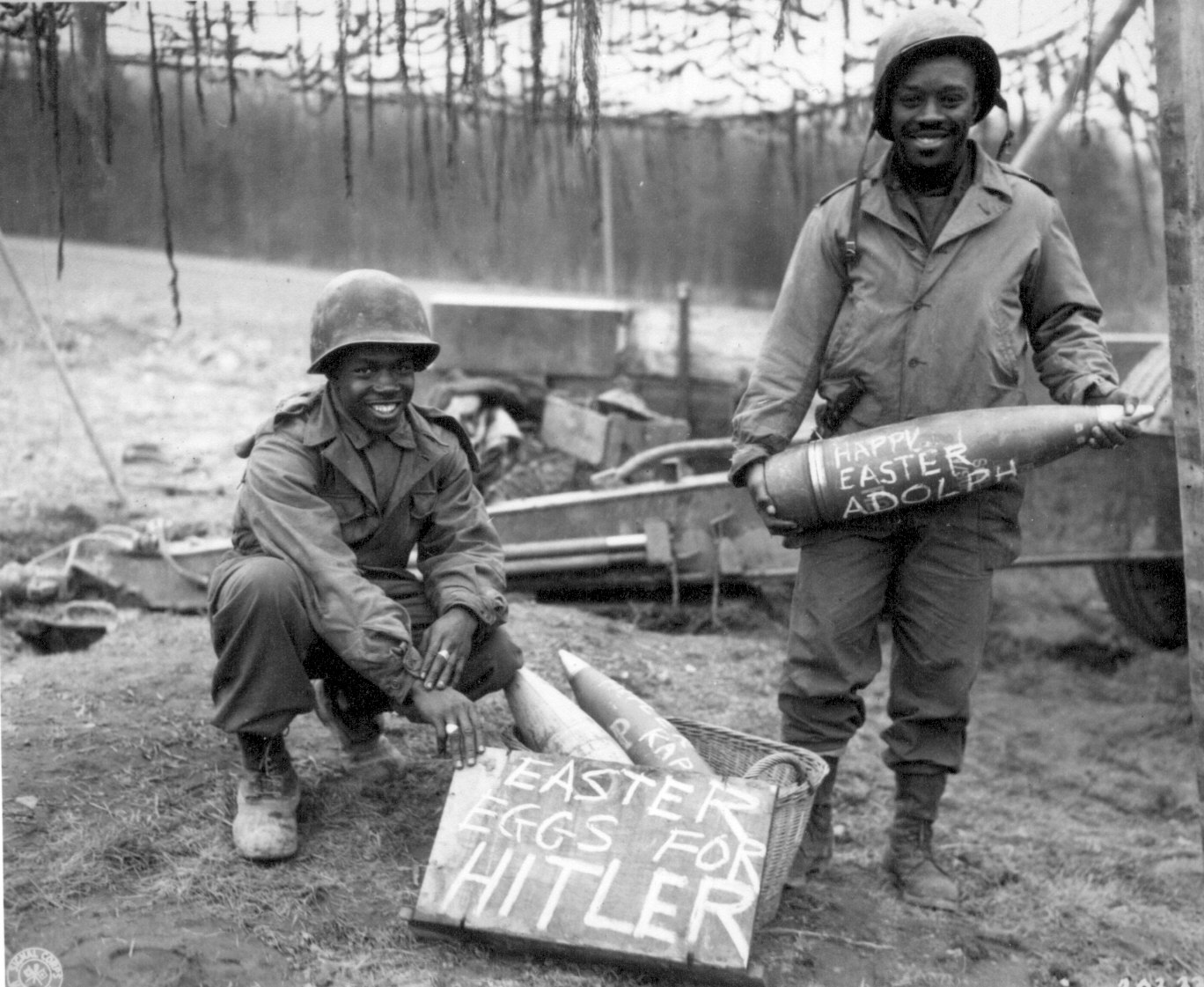
Enlarge
Original Caption: “Easter morning, T/5 William E. Thomas…and Pfc. Joseph Jackson…will roll specially prepared eggs on Hitler’s lawn.” Local Identifier: 111-SC-202330, National Archives Identifier: 531253.
View in National Archives Catalog
22. “Members of Battery A, 4520 AA stand by and check their equipment while the convoy takes a break.” November 9, 1944. Musae. National Archives Identifier: 531222, Local Identifier: 111-SC-196212-S.
23. “Pvt. William A. Reynolds…, an ambulance driver exhibits a .50-caliber machine gun bullet which lodged above the windshield of his vehicle when he was strafed by a German plane while driving at the front in France…” 1944. National Archives Identifier: 535536, Local Identifier: 208-AA-32P-18.
24. “Two smiling French soldiers fill the hands of American soldiers with candy, in Rouffach, France, after the closing of the Colmar pocket.” February 5, 1945. Todd. National Archives Identifier: 531247, Local Identifier: 111-SC-199861-S.
25. “A platoon of Negro troops surrounds a farm house in a town in France, as they prepare to eliminate a German sniper holding up an advance. Omaha Beachhead, near Vierville-sur-Mer, France.” June 10, 1944. Todd. National Archives Identifier: 531188, Local Identifier: 111-SC-190120.
26. “Volunteer combat soldiers prepare for a day’s training in preparation for shipment to veteran units at front lines in Germany.” February 28, 1945. Edgren. National Archives Identifier: 531357, Local Identifier: 111-SC-337901.
27. “Cpl. Carlton Chapman…is a machine-gunner in an M-4 tank, attached to a Motor Transport unit near Nancy, France.” 761st Mt. Bn. November 5, 1944. Ryan. National Archives Identifier: 531221, Local Identifier: 111-SC-196106-S.
28. “… troops of a field artillery battery emplace a 155mm howitzer in France. They have been following the advance of the infantry and are now setting up this new position.” June 28, 1944. Rothenberger. National Archives Identifier: 531198, Local Identifier: 111-SC-191890-S.
29. “T/5 Dexter Clayton…and M/Sgt. Nelson T. Ewing…are tying wire to pole after sag is taken up. France.” July 25, 1944. Gallo. National Archives Identifier: 531197, Local Identifier: 111-SC-191834-S.
30. “This mine detector crew is demonstrating what they do before going to work on or around telephone poles in France.” Left to right: M/Sgt. Bennie Burns, Sgt. Vincent MacNeill, Sgt. Frank Mack, Pfc. Riggles McCutcheon, T/Sgt. John A. Barbee, and Sgt. Thomas G. Alexander. July 13, 1944. Norton. National Archives Identifier: 531193, Local Identifier: 111-SC-191360-S.
31. “Soldiers of the 161st Chemical Smoke Generating Company, U.S. Third Army, move a barrel of oil in preparation to refilling an M-2 smoke generator, which spews forth a heavy cloud of white smoke. These men are engaged in laying a smoke screen to cover bridge building activities across the Saar River near Wallerfangen, Germany.” December 11, 1944. Rothenberger. National Archives Identifier: 531229, Local Identifier: 111-SC-197552.
32. “Pvts. George Cofield…and Howard J. Davis…guard a newly-constructed bridge site over the Rhine River, built by U.S. Ninth Army Engineers.” March 30, 1945. T/5 H. R. Weber and Pfc. Sperry. National Archives Identifier: 531273, Local Identifier: 111-SC-204770.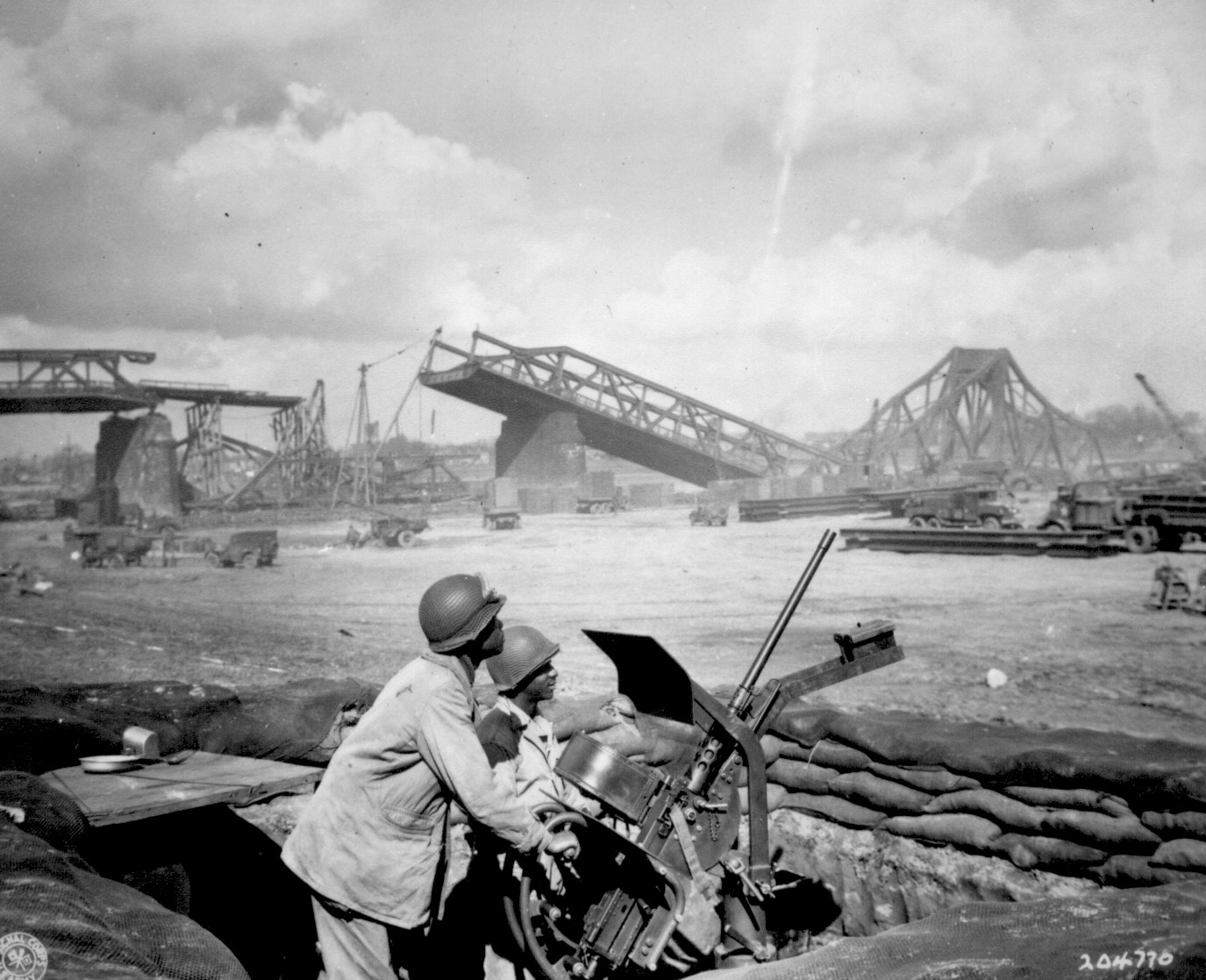
Enlarge
Original Caption: “Pvts. George Cofield…and Howard J. Davis…guard a newly-constructed bridge site over the Rhine River, built by U.S. Ninth Army Engineers.” Local Identifier: 111-SC-204770, National Archives Identifier: 531273.
View in National Archives Catalog
33. “Crews of U.S. light tanks stand by awaiting call to clean out scattered Nazi machine gun nests in Coburg, Germany.” April 25, 1945. National Archives Identifier: 535534, Local Identifier: 208-AA-32P-10.
34. “Maj. Gen. Edward M. Almond, Commanding General of the 92nd Infantry (`Buffalo’) Division in Italy, inspects his troops during a decoration ceremony.” Ca. March 1945. National Archives Identifier: 535547, Local Identifier: 208-AA-47Y-1.
35. “Members of a Negro mortar company of the 92nd Division pass the ammunition and heave it over at the Germans in an almost endless stream near Massa, Italy. This company is credited with liquidating several machine gun nests…” ca. November 1944. Acme. National Archives Identifier: 535546, Local Identifier: 208-AA-47U-6.
36. “Tricky Nazi captured. German prisoner wearing civilian clothes, sits in jeep at south gate of walled city of Lucca, Italy, awaiting removal to a rear area.” Ca. September 1944. National Archives Identifier: 535566, Local Identifier: 208-AA-305A-2.
37. “Pfc. Robert Askew…with the 3278th Quartermaster Company, examines overshoes which have been turned in. Overshoes proved their worth and helped prevent trench foot during the rains.” April 8, 1944. Lapidus. National Archives Identifier: 531412, Local Identifier: 111-SC-371005.
38. “Body of American soldier is borne on stretcher from terrain in vicinity of Malmedy, Belgium, where on or about 17 December 1944, the Germans committed many atrocities.” ca. December 1944. Taylor. National Archives Identifier: 532956, Local Identifier: 153-WC-1-19.
39. “This Negro combat patrol advanced three miles north of Lucca (furthermost point occupied by American troops) to contact an enemy machine gun nest. Here a bazooka-man cuts loose at the target some 300 yards distant.” September 7, 1944. Edwards. National Archives Identifier: 531216, Local Identifier: 111-SC-194328.
40. “Negro `doughfoots’ of the 92nd Infantry (`Buffalo’) Division pursue the retreating Germans through the Po Valley. German forces in Italy have since capitulated unconditionally.” Ca. May 1945. National Archives Identifier: 535550, Local Identifier: 208-AA-49E-1-13.
41. “Genoa, Italy. In this newly liberated city the 92nd Division troops enter the Galleria Guiseppe [sic] Garibaldi.” April 27, 1945. Leviton. National Archives Identifier: 531355, Local Identifier: 111-SC-337144.
42. “Capt. Ezekia Smith, 370th Inf. Regt., 92nd Div., receives treatment at the 317th Collecting Station, for shell fragments in face and shoulders suffered near Querceta, Italy. Here, surgeon stitches the wound. Fifth Army, Pietrasanta Area, Italy.” February 10, 1945. Bull. National Archives Identifier: 531332, Local Identifier: 111-SC-236685.
Army Air Forces
43. “Howard A. Wooten.” Graduated December 1944 from Air Corps School, Tuskegee, AL. Ca. December 1944. National Archives Identifier: 512886, Local Identifier: 18-T-44-K-17.
44. “Members of the 99th Fighter Squadron of the Army Air Forces, famous all-Negro outfit, who are rapidly making themselves feared by enemy pilots, pose for a picture at the Anzio beachhead. In the foreground, head bared, is 1st Lt. Andrew Lane.” Ca. February 1944. National Archives Identifier: 520624, Local Identifier: 80-G-54413.
45. “1909th Engineers Aviation Battalion (Negro) aboard LST 683. ” August 15, 1945. National Archives Identifier: 520691, Local Identifier: 80-G-337464.
46. “With an officer giving them pointers from a giant map, pilots of an American P-51 Mustang fighter-bomber group learn their `target for today’ during a briefing at a base in Italy. Both the map and the briefing chart (right) indicate another objective in Germany will soon be on the receiving end of their bullets and bombs. The men are members of the 15th U.S. Army Air Force, whose planes fly as part of the Mediterranean Allied Air Force.” Ca. September 1944. National Archives Identifier: 535766, Local Identifier: 208-MO-18K-32983.
47. “Fliers of a P-51 Mustang Group of the 15th Air Force in Italy `shoot the breeze’ in the shadow of one of the Mustangs they fly.” Left to right: Lt. Dempsey W. Morgan, Jr.; Lt. Car roll S. Woods; Lt. Robert H. Nelson, Jr.; Capt. Andrew D. Turner; and Lt. Clarence P. Lester. Ca. August 1944. National Archives Identifier: 535842, Local Identifier: 208-NP-6XXX-1.
48. “Pilots of a U.S. Army Air Forces fighter squadron, credited with shooting down 8 of the 28 German planes destroyed in dog-fights over the new Allied beachheads south of Rome, on Jan. 27, talk over the day’s exploits at a U.S. base in the Mediterranean theater. Negro members of this squadron, veterans of the North African and Sicilian campaigns, were formerly classmates at a university in the southern U.S.” February 1944. National Archives Identifier: 535763, Local Identifier: 208-MO-18H-22051.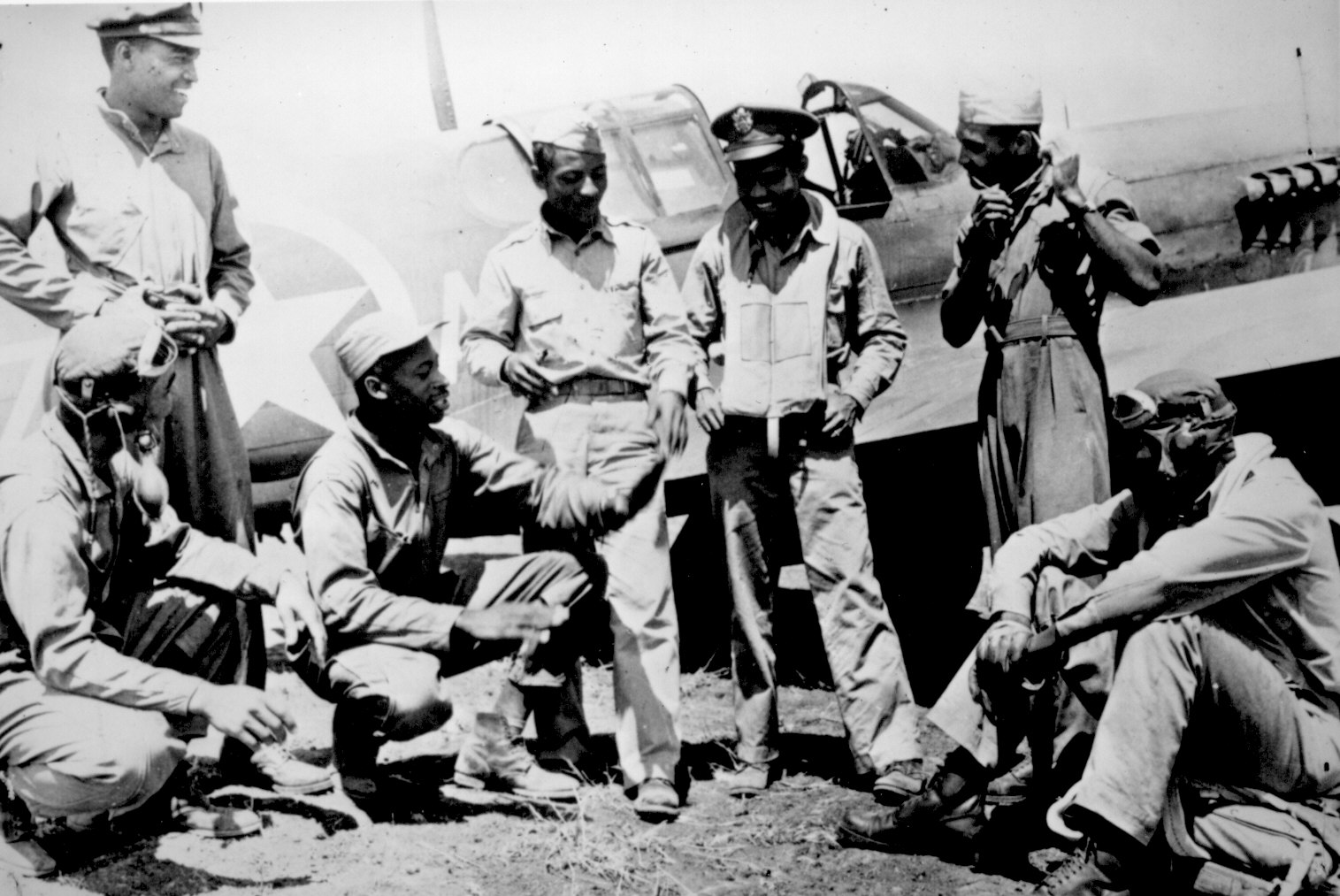
Enlarge
Original Caption: “Pilots of a U.S. Army Air Forces fighter squadron.” Local Identifier: 208-MO-18H-22051, National Archives Identifier: 535763.
View in National Archives Catalog
49. “American pilots of a P-51 Mustang fighter group, whose planes are named after wild horses that once roamed the U.S., listen intently as they are briefed for a mission at a base in Italy. Like cavalrymen of old, they ride down the enemy in their flying steeds and have destroyed German installations and personnel throughout Europe. They are members of the 15th U.S. Army Air Force, whose fighters and bombers are part of the Mediterranean Allied Air Force, which also includes British, French, and Polish fliers.” Ca. September 1944. National Archives Identifier: 535788, Local Identifier: 208-N-32987.
50. “[Capt. Andrew D. Turner], who in a few minutes will be escorting heavy bombers en route to enemy targets, signals to the chief of his ground crew before taking off from a base in Italy. He is a member of the 15th U.S. Army Air Force, which has been smashing enemy objectives in Germany and the Balkans with both fighter and bomber craft. The pilot’s plane, a Mustang, is named for a type of wild horse that once roamed in America.” ca. September 1944. National Archives Identifier: 535765, Local Identifier: 208-MO-18K-32981.
51. “Lt. Andrew D. Marshall, pilot in a Negro fighter group of the Mediterranean Allied Air Force had his plane shot up by flak during a strafing mission over Greece before the Allied invasion. When he came down all that was left of the plane was his engine and himself. But he only suffered some bruises and cuts. Greeks hid him from the Nazis, then directed him to the British forces when they parachuted into Greece. Here Lt. Marshall tells an American pilot of the 51st Troop Carrier Wing of his harrowing experience.” ca. October 1944. National Archives Identifier: 535556, Local Identifier: 208-AA-102E-5.
52. “Members of the Nation’s first Negro Navigation Cadets, who will receive their commissions in the Army Air Forces on February 26th, visited City Hall as guests of Mayor Fiorello H. La Guardia this afternoon. They are shown on the steps of City Hall as the mayor greeted their commanding officer, Maj. Galen B. Price.” February 16, 1944. Acme. National Archives Identifier: 535936, Local Identifier: 208-PU-113M-26.
53. “Capts. Lemuel R. Custis (left) and Charles B. Hall, of the 99th Fighter Squadron of the U.S. Army Air Forces, chat while on leave in New York City. Their all-Negro squadron first went into action in North Africa on June 4, 1943, and is now closely supporting Allied ground forces advancing in Italy. The fighter group flies all types of combat missions–bomber escort, dive bombing, patrol for beachheads, and strafing. In one year, the squadron has made more than 3,000 sorties and has shot down 17 planes, scored 3 probables and damaged 6 other planes.” Ca. June 1944. National Archives Identifier: 535767, Local Identifier: 208-MO-120H-29054.
54. “1st Lt. Lee Rayford…who has returned to the United States from Italy where he served with the 99th Fighter Squadron. The nature of his assignment here has not been announced. Other pilots formerly assigned to the 99th now back in America include 1st Lts. Walter I. Lawson, Charles W. Dryden, Graham Smith and Louis R. Purnell.” N.d. National Archives Identifier: 535836, Local Identifier: 208-NP-6EEE-1.
55. “An armorer of the 15th U.S. Air Force checks ammunition belts of the .50 caliber machine guns in the wings of a P-51 Mustang fighter plane before it leaves an Italian base for a mission against German military targets. The 15th Air Force was organized for long range assault missions and its fighters and bombers range over enemy targets in occupied and satellite nations, as well as Germany itself.” Ca. September 1944. National Archives Identifier: 535764, Local Identifier: 208-MO-18H-32984.
56. “Members of the ground crew of a Negro fighter squadron of the 15th U.S. Air Force in Italy place a loaded wing tank on a P-51 Mustang before the group takes off on another mission escorting bombers over enemy targets. The squadron uses the auxiliary fuel tanks for long distance flights.” Left to right: T/Sgt. Charles K. Haynes, S/Sgt. James A. Sheppard, and M/Sgt. Frank Bradley. N.d. National Archives Identifier: 535549, Local Identifier: 208-AA-49E-1-3.
57. “Sharing credit for Negro fighter pilots’ victory over Nazis are mechanics George Johnson…and James C. Howard… . Their outfit, the 99th Fighter Squadron, bagged 12 Nazi fighter planes in two days.” Ca. February 1944. National Archives Identifier: 535548, Local Identifier: 208-AA-49E-1-1.
58. “Capt. Wendell O. Pruitt…, one of the leading pilots of the 15th Air Force always makes sure that he leaves his valuable ring with his crew chief, S/Sgt. Samuel W. Jacobs.” Ca. November 1944. National Archives Identifier: 535541, Local Identifier: 208-AA-46BB-4.
Enlarge
Original Caption: “Capt. Wendell O. Pruitt…, one of the leading pilots of the 15th Air Force always makes sure that he leaves his valuable ring with his crew chief, S/Sgt. Samuel W. Jacobs.” Local Identifier: 208-AA-46BB-4, National Archives Identifier: 535541.
View in National Archives Catalog
59. “Staff Sgt. William Accoo…, crew chief in a Negro group of the 15th U.S. Air Force, washes down the P-51 Mustang fighter plane of his pilot with soap and water before waxing it to give it more speed.” Ca. September 1944. National Archives Identifier: 535543, Local Identifier: 208-AA-46BB-30.
60. “Staff Sgt. Alfred D. Norris…crew chief of a Negro fighter group of the 15th U.S. Air Force, closes the canopy of a P-51 Mustang for his pilot, Capt. William T. Mattison…operations officer of the squadron based in Italy.” N.d. National Archives Identifier: 535542, Local Identifier: 208-AA-46BB-6.
61. “Staff officers of an…Air Corp Squadron near Fez, French Morocco. Left to right: Lt. Col. Benjamin O. Davis, C.O.; Capt. Hayden C. Johnson, Adjutant; Capt. E. Jones, Service Det.; Lt. Wm. R. Thompson, Armaments; Lt. Hervert E. Carter, Engineers; Lt. Erwin B. Lawrence, Operations; Lt. George R. Currie, Ordnance.” May 12, 1943. National Archives Identifier: 531174, Local Identifier: 111-SC-184968.
62. “Jackie Wilson (left) and Ray Robinson have fought two bitterly contested ring encounters. Now it’s Sgt. Wilson and Pvt. Robinson in the same Aviation Squadron at Mitchel Field, New York, and they stand shoulder to shoulder–ready for a fight to the death on the Axis.” 1943. National Archives Identifier: 535945, Local Identifier: 208-PU-214B-5.
US Navy
63. “The crew of the U.S. Navy submarine chaser [PC 1264] salutes the United States flag as the 173-foot long escort vessel is commissioned in a U.S. East Coast port. As soon as they qualify through experience and training, eight members of the crew of 53 Negro sailors will replace the present chief petty officers.” May 1, 1944. National Archives Identifier: 535785, Local Identifier: 208-N-26553.
64. “Negro sailors of the U.S.S. Mason (DE 529) commissioned at Boston Navy Yard on 20 Mar. 1944 proudly look over their ship which is the first to have [a] predominately Negro crew.” March 20, 1944. National Archives Identifier: 520644, Local Identifier: 80-G-218861.
Enlarge
Original Caption: Negro sailors of the USS MASON commissioned at Boston Navy Yard 20 March 1944 proudly look over their ship which is first to have predominantly Negro crew. Local Identifier: 80-G-218861, National Archives Identifier: 520644.
View in National Archives Catalog
65. “A gun crew of six Negroes who were given the Navy Cross for standing by their gun when their ship was damaged by enemy attack in the Philippine area.” Crew members: Jonell Copeland, AtM2/c; Que Gant, StM; Harold Clark, Jr., StM; James Eddie Dockery, StM; Alonzo Alexander Swann, StM; and Eli Benjamin, StM. Ca. 1945. National Archives Identifier: 520688, Local Identifier: 80-G-334029.
66. “Negro messmen aboard a United States Navy cruiser who volunteered for additional duty as gunners. They have been doing proficient work under battle conditions on a task force in the Pacific under the instruction of the officers at the right.” July 10, 1942. National Archives Identifier: 520597, Local Identifier: 80-G-21743.
67. “His crew sank a German submarine.” U.S.S. Otter (DE 210). Ca. March 1945. National Archives Identifier: 535845, Local Identifier: 208-NP-7HHH-1.
68. “Capt. H. W. Taylor making award presentations aboard U.S.S. Cowpens (CVL 25). Fred Magee, Jr., St3/c USN, receiving commendation of the Secretary of the Navy.” The commendation was for attempting to rescue, at a risk to his own life, a shipmate from drowning. October 1944. National Archives Identifier: 520664, Local Identifier: 80-G-291220.
69. “Charlie Dunston, S1/c, amputee case at the Naval Hospital, Philadelphia, PA…” August 1, 1945. Ens. Thomas Binford. National Archives Identifier: 520698, Local Identifier: 80-G-377110.
70. Children aboard the SS Jean Lafitte, bound for the States with internees freed from a Japanese internment camp in the Philippines, gather around Pendleton (Bumblebee) Thompson. Thompson volunteered as cook in the camp where they were interned. Ca. April 1945. National Archives Identifier: 520635, Local Identifier: 80-G-128907.
71. “Coxswain William Green observes safety precautions in checking his pistol while Albert S. Herbert, Quartermaster first class…, stands by with a clip of ammunition and holster belt, ready to complete the formalities.” N.d. National Archives Identifier: 535844, Local Identifier: 208-NP-7CCC-1.
72. “Enlisted men serving on Espiritu Santo in the New Hebrides…placing 6-inch shells in magazines at the Naval Ammunition Depot.” From left to right: S1/c Dodson B. Samples, S1/c Raymond Wynn, S1/c Edward L. Clavo, and S1/c Jesse Davis. N.d. National Archives Identifier: 520631, Local Identifier: 80-G-123941.
73. “… entrance to the U.S. Navy Base Camp Annex, Espiritu Santo, New Hebrides.” Guards on duty: S1/c Dook Bland and S1/c Taft Gray. N.d. National Archives Identifier: 520632, Local Identifier: 80-G-123962.
74. “Construction of the prefabricated steel storage warehouse [by members of the 34th Construction Bn.] at Halavo Seaplane Base, Florida Island [Solomon Islands].” September 19, 1943. National Archives Identifier: 520629, Local Identifier: 80-G-89138.
75. “M. D. Shore, S1/c, operating a forklift truck at the Navy supply depot at Guam, Marianas.” June 8, 1945. National Archives Identifier: 520685, Local Identifier: 80-G-330221.
76. “Halavo Seaplane Base, Florida Island, Solomons, plumbing department personnel. The entire front row except the CPO are natives…” N.d. National Archives Identifier: 518842, Local Identifier: 71-SB-28-3.
77. “34th CBs working on purification of their water supply at Solomon Islands.” Ca. August 1945. National Archives Identifier: 520640, Local Identifier: 80-G-203393.
78. “Enlisted men aboard the U.S.S. Ticonderoga (CV-14) hear the news of Japan’s surrender.” August 14, 1945. Lt. B. Gallagher. National Archives Identifier: 520868, Local Identifier: 80-G-469544.
79. “Group of recently appointed Negro officers.” Left to right, front row: Ensigns George Clinton Cooper, Graham Edward Martin, Jesse Walter Arbor, John Walter Reagan, Reginald Ernest Goodwin. Back row, left to right, Ensigns Phillip George Barnes, Samuel Edward Barnes, Dalton Louis Baugh, James Edward Hare, Frank Ellis Sublett, and WO Charles Byrd Lear. February 1944. National Archives Identifier: 520671, Local Identifier: 80-G-300215.
80. “Lt. Cmdr. Grady Avent, USNR, Commanding Officer at the Navy’s largest Negro base, Manana Barracks, Hawaii, inspects plans presented by Public Works Officer, Lt. Edward S. Hope, USNR, [right] Navy’s highest ranking Negro officer.” N.d. National Archives Identifier: 535854, Local Identifier: 208-NP-8E-1.
81. “A dispensary at a Naval ammunition depot in the Marianas. Prevention against a case of sore throat. Patient–Dan Kennedy, S1/c, `Dr.’ Stanton B. Shaw, PhM2/c, who is in charge.” June 8, 1945. National Archives Identifier: 520684, Local Identifier: 80-G-330215.
82. “Group of CBs acting as stretcher bearers for the 7th Marines. Peleliu.” September 1944. Sgt. McBride. National Archives Identifier: 532537, Local Identifier: 127-N-96475.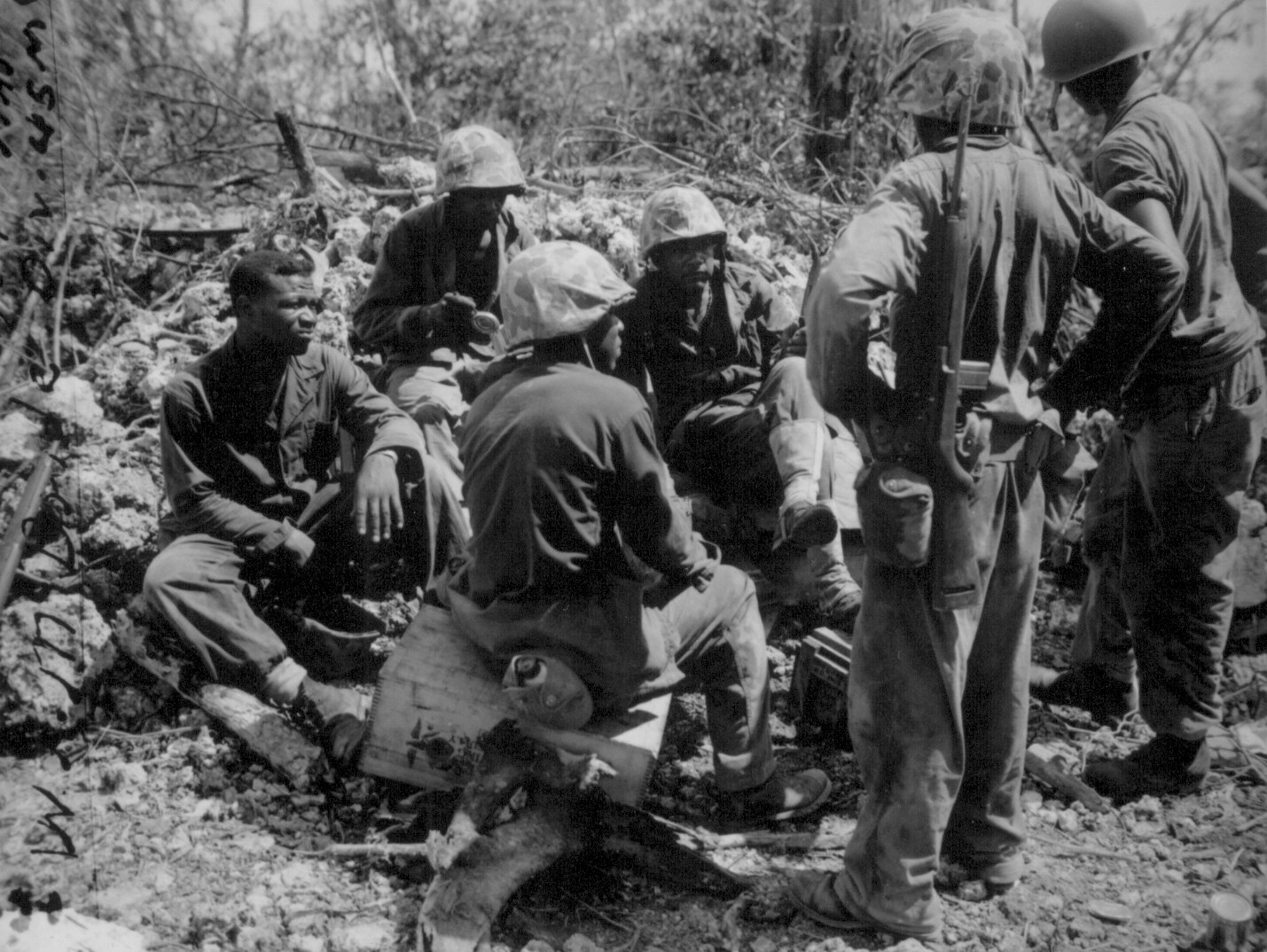
Enlarge
Original Caption: “Group of CBs acting as stretcher bearers for the 7th Marines. Peleliu.” Local Identifier: 127-N-96475, National Archives Identifier: 532537.
View in National Archives Catalog
83. “Leading petty officers of one of the Navy’s new Logistics Support Companies… This company is undergoing combat training by Service Force Advance Base Section at a station on Oahu Island prior to their departure for duty in a combat area.” Left to right, front row: Boatswain Mate Second Class James W. Chase and Coxswain John D. Perry. Left to right, back row: Coxswains Raymond C. Vaultz, Elmer Williams, Darrel M. Beech, and Jimmie Cook. May 10, 1945. National Archives Identifier: 535537, Local Identifier: 208-AA-43TT-1.
84. “E. Perry, Seaman 1/c, is splicing steel cable… This is a highly specialized naval activity. Some of the most constructive work at any naval command is performed by the `riggers.'” May 17, 1945. National Archives Identifier: 535850, Local Identifier: 208-NP-7QQ-6.
85. “Looking to sea from the signal bridge is Napoleon Reid, Seaman 2/c., USNR, shown standing on lookout watch on a ship somewhere in the Pacific.” March 19, 1945. National Archives Identifier: 535846, Local Identifier: 208-NP-7III-1.
86. “William Baldwin, first Navy Negro recruit for General Service.” June 2, 1942. National Archives Identifier: 535852, Local Identifier: 208-NP-8B-2.
87. “Crewmen aboard U.S.S. Tulagi (CVE-72) en route to southern France for Aug. 15th invasion. Miles Davis King, StM 2/c, carrying a loaded magazine to his 20mm gun.” August 1944. National Archives Identifier: 520763, Local Identifier: 80-G-417623.
88. “Negro mechanics work on PBY at NAS Seattle, WA, Alvin V. Morrison, AMM 3/c, doing overhaul.” April 27, 1944. National Archives Identifier: 520648, Local Identifier: 80-G-233274.
89. “Richard Salter, CK 3/c, a talker of a gun station, aboard the U.S.S. Tulagi (CVE-72) off the coast of southern France.” August 1944. Lt. Wayne Miller. National Archives Identifier: 520858, Local Identifier: 80-G-468780.
90. “Steward’s mates joke as they dry silverware in the wardroom of U.S.S. Ticonderoga (CV-14).” November 1944. Lt. Wayne Miller. National Archives Identifier: 520869, Local Identifier: 80-G-469560.
91. “… [The] tug YTM 466, operating out of the Mine Warfare School, Yorktown, VA. Her captain is T. Perdue, Boatswain Mate 1/c…” May 17, 1945. National Archives Identifier: 535848, Local Identifier: 208-NP-7QQ-4.
92. A deck hand loops a manila line. N.d. National Archives Identifier: 535849, Local Identifier: 208-NP-7QQ-5.
US Marine Corps
93. Photograph of Marine Howard P. Perry at Camp Lejeune, North Carolina. Original Caption: “Breaking a tradition of 167 years, the U.S. Marine Corps started enlisting Negroes on June 1, 1942. The first class of 1,200 Negro volunteers began their training 3 months later as members of the 51st Composite Defense Battalion at Montford Point, a section of the 200-square-mile Marine Base, Camp Lejeune, at New River, NC.” National Archives Identifier: 535870, Local Identifier: 208-NP-10KK-1.
94. “The first Negro to be commissioned in the Marine Corps has his second lieutenant’s bars pinned on by his wife. He is Frederick C. Branch of Charlotte, NC.” November 1945. National Archives Identifier: 532577, Local Identifier: 127-N-500043.
95. “Handling Negro Marine public relations at the Montford Point Camp here are Sgt. Lucious A. Wilson (left)…, and his photographer, Cpl. Edwin K. Anderson… Sgt. Wilson is a former correspondent for the New York Amsterdam News….” N.d. National Archives Identifier: 535867, Local Identifier: 208-NP-10FFFF-1.
96. “Marine Cpl. Robert L. Hardin…checks the main distributing frame in Montford Point’s headquarters for line difficulties.” N.d. Sgt. L. A. Wilson. National Archives Identifier: 532515, Local Identifier: 127-N-8768.
97. “… Although a dress uniform is not a part of the regular equipment, most of the Negro Marines spend $54 out of their pay for what is generally considered the snappiest uniform in the armed services… Photo shows a group of the Negro volunteers in their dress uniforms.” Ca. May 1943. Roger Smith. National Archives Identifier: 535871, Local Identifier: 208-NP-10NN-2.
98. “First Negro Marines decorated by the famed Second Marine Division somewhere in the Pacific (left to right) Staff Sgt Timerlate Kirven…and Cpl. Samuel J. Love, Sr… They received Purple Hearts for wounds received in the Battle of Saipan…” N.d. National Archives Identifier: 535872, Local Identifier: 208-NP-10SSSS-1.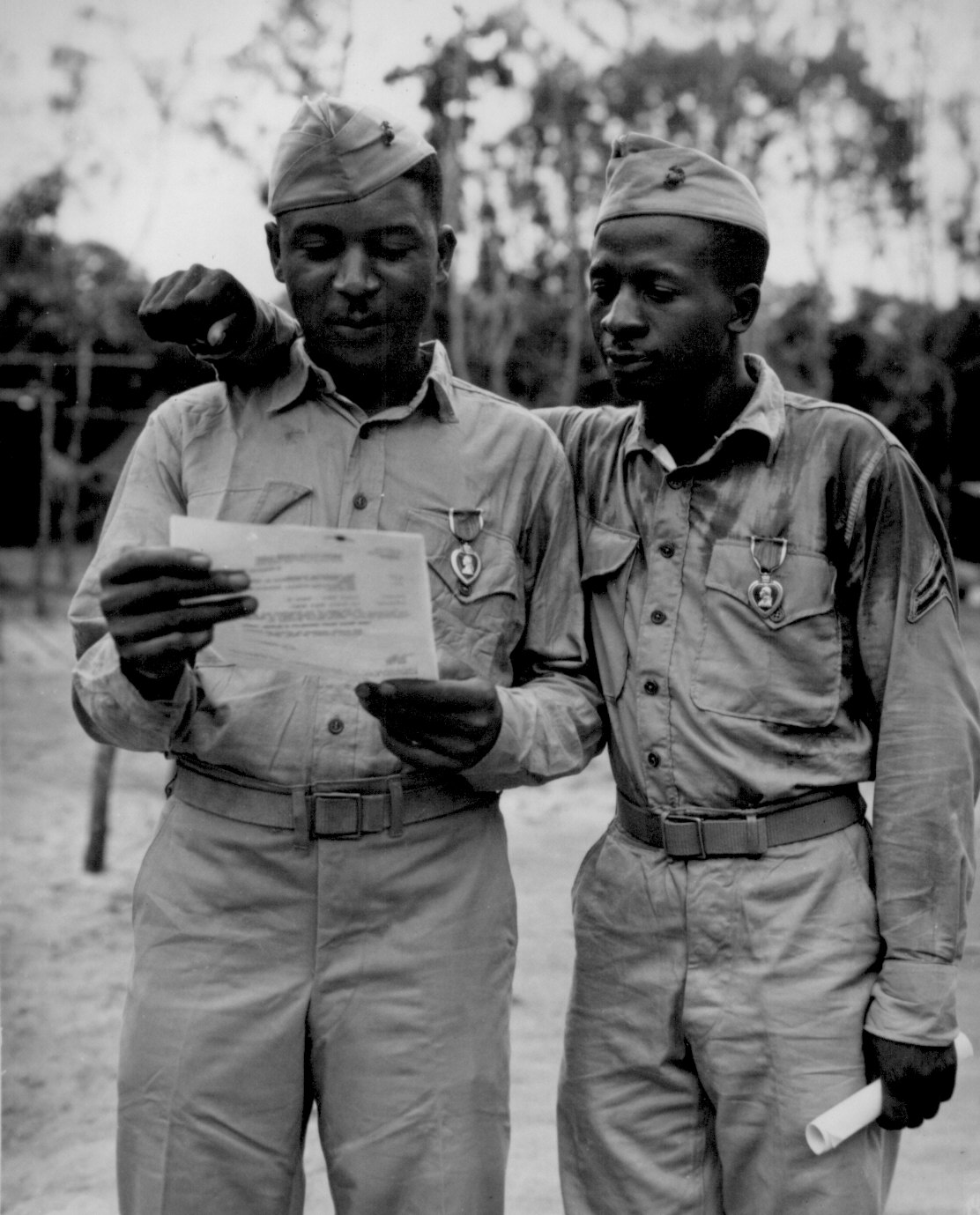
Enlarge
Original Caption: “Marines decorated by the famed Second Marine Division somewhere in the Pacific (left to right) Staff Sgt Timerlate Kirven…and Cpl. Samuel J. Love, Sr… They received Purple Hearts for wounds received in the Battle of Saipan…” Local Identifier: 208-NP-10SSSS-1, National Archives Identifier: 535872.
View in National Archives Catalog
99. “Pfc. Luther Woodward…, a member of the Fourth Ammunition Company, admires the Bronze Star awarded to him for `his bravery, initiative and battle-cunning.’ …” The award was later upgraded to the Silver Star. April 17, 1945. Cpl. Irving Deutch. National Archives Identifier: 532553, Local Identifier: 127-N-119492.
100. “Marines, following the rapid Japanese retreat northward on Okinawa, pause for a moments rest at the base of a Japanese war memorial. They are (on steps) Pfc. F. O. Snowden; Navy Pharmacist’s Mate, 2nd class R. Martin; (on monument, left to right) Pvt. J. T. Walton, Pvt. R. T. Ellenberg, Pfc. Clyde Brown, Pvt. Robb Brawner. Photo was taken during the battle for Okinawa.” April 12, 1945. Cpl. Art Sarno. National Archives Identifier: 532550, Local Identifier: 127-N-117624.
101. “Peleliu Island…Marines move through the trenches on the beach during the battle.” September 15, 1944. Fitzgerald. National Archives Identifier: 532535, Local Identifier: 127-N-9527.
102. “Iwo Jima…Negro Marines on the each at Iwo Jima are, from left to right, Pfcs. Willie J. Kanody, Elif Hill, and John Alexander.” March 1945. C. Jones. National Archives Identifier: 532546, Local Identifier: 127-N-11383.
103. “Negro Marines, attached to the Third Ammunition Company, take time out from supplying ammunition to the front line on Saipan. Riding captured…bicycle is Pfc. Horace Boykin; and left to right, Cpl. Willis T. Anthony, Pfc. Emmitt Shackelford, and Pfc. Eugene Purdy.” June 1944. National Archives Identifier: 532531, Local Identifier: 127-N-8600.
104. “Aboard a Coast Guard-manned transport…, a Negro Marine, Robert Stockman, goes over his carbine with Coast Guardsmen.” Ca. February 1944. National Archives Identifier: 513195, Local Identifier: 26-G-321.
105. “Aboard a Coast Guard-manned transport somewhere in the Pacific, these Negro Marines prepare to face the fire of Jap[anese] gunners.” Ca. February 1944. National Archives Identifier: 513197, Local Identifier: 26-G-321.
106. “Surrounded by a veteran crew of Marines who have spent 15 months in the Southwest and Central Pacific, this gun, named the ‘Lena Horne’ by its crew, points majestically skyward. The gun is manned by members of [the 51st] Defense Battalion, one of two such Negro units in the Corps.” 1945. Nicholson. National Archives Identifier: 532556, Local Identifier: 127-N-12174.
107. “Two Negro Marine movie operators.” January 1945. National Archives Identifier: 532539, Local Identifier: 127-N-109561.
108. “Two Negro duck [DUKW] drivers turn riflemen after their vehicle is destroyed.” February 19, 1945. Christian. National Archives Identifier: 532545, Local Identifier: 127-N-111123.
109. “Marine Sgt. F. Smit…and Cpl. S. Brown…open a coconut to get a cool drink on Saipan.” June 1944. National Archives Identifier:
532391, Local Identifier: 127-GW-1359-85636.
110. “Carrying a Jap[anese] prisoner from stockade to be evacuated and treated for malnutrition. Iwo Jima.” February 23, 1945. Don Fox. National Archives Identifier: 532544, Local Identifier: 127-N-110622.
111. “Negro assault troops await orders D-day to attack enemy shortly after they had come ashore at Saipan in the Marianas.” June 1944. T/Sgt. William Fitch. U.S. Coast Guard. National Archives Identifier: 532528, Local Identifier: 127-N-83928.
112. “Coast Guardsman Aught Guttery, Jr., first class Steward’s Mate,…is shown aboard the Coast Guard-manned assault transport on which he served during the initial landings at Guam.” N.d. National Archives Identifier: 535864, Local Identifier: 208-NP-8WWW-9.
113. “Coast Guardsman Charles Tyner, Fireman first class, examines the jagged shrapnel hole in the helmet he wore during the initial assault on the beaches of Southern France… Tyner suffered just a superficial scratch… .” N.d. National Archives Identifier: 513183, Local Identifier: 26-G-2748.
114. “Two Coast Guard officers brave the wintry blasts of snow aboard a Coast Guard cutter on the North Atlantic patrol. The officers who give their cheery greetings despite the icy weather are Lt.(jg.) Clarence Samuels (right) and Ens. J.J. Jenkins (left)…” N.d. National Archives Identifier: 513211, Local Identifier: 26-G-3686.
115. “Five steward’s mates stand at their battle stations, as a gun crew aboard a Coast Guard-manned frigate in the southwest Pacific. On call to general quarters, these Coast Guardsmen man a 20mm AA gun. They are, left to right, James L. Wesley, standing with a clip of shells; L. S. Haywood, firing; William Watson, reporting to bridge by phone from his gun captain’s post; William Morton, loading a full clip, assisted by Odis Lane, facing camera across gun barrel.” N.d. National Archives Identifier: 513214, Local Identifier: 26-G-3797.
116. “… crew members who man the 20mm guns of a Coast Guard fighting ship have won an enviable reputation for gunnery results, due primarily to incessant practice in assembly and operation. As expressed by the intent faces in this picture, these men play for keeps.” N.d. National Archives Identifier: 513191, Local Identifier: 26-G-3154.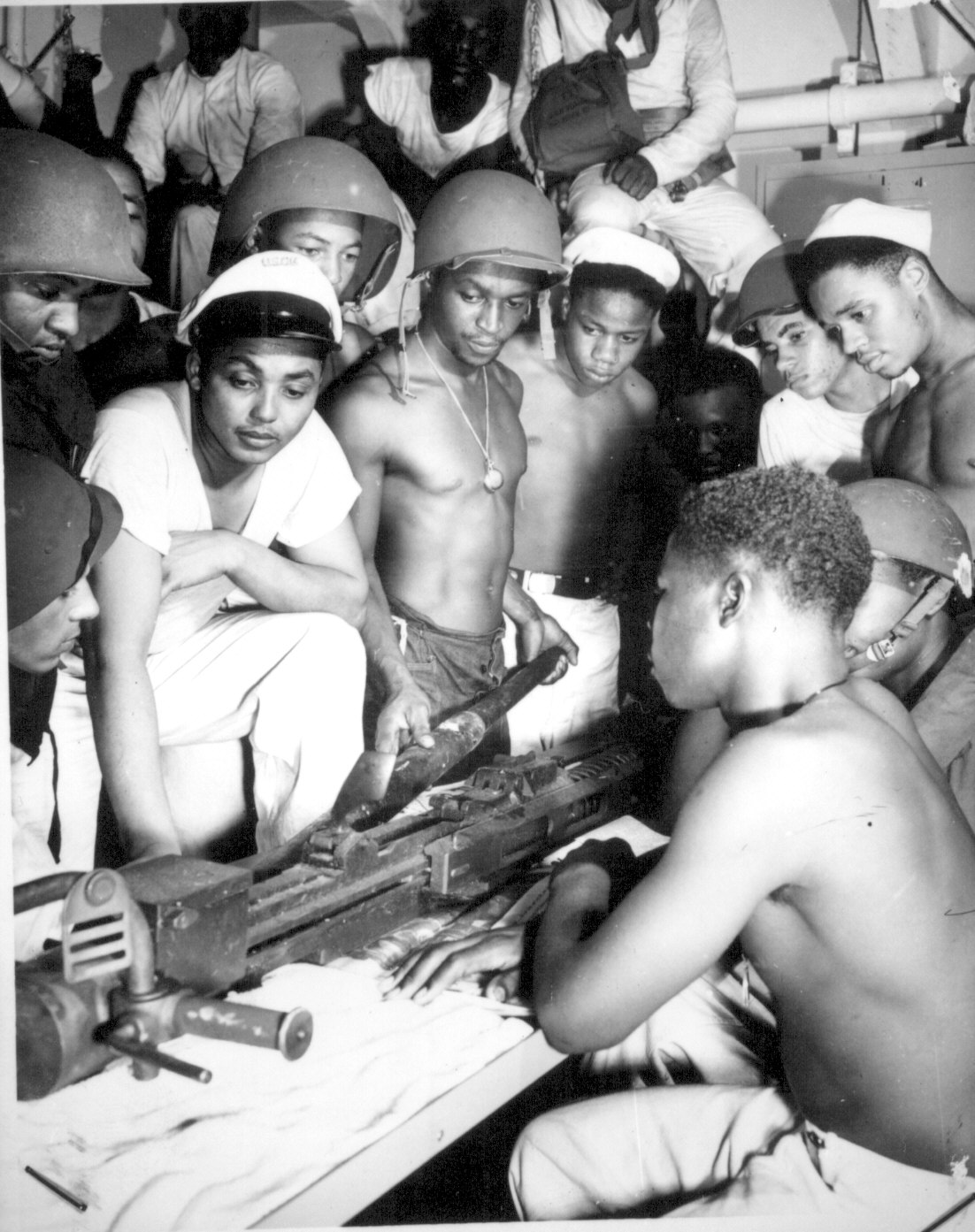
Enlarge
Original Caption: “Crew members who man the 20 MM guns of a Coast Guard fighting ship.” Local Identifier: 26-G-3154, National Archives Identifier: 513191.
View in National Archives Catalog
117. Coast Guardsman. N.d. National Archives Identifier: 535862, Local Identifier: 208-NP-8WWW-3.
118. “… crew of a 20mm gun aboard a Coast Guard fighting ship are hanging up some new records for speed and accuracy. Left to right: Daniel Moore, Walter L. Bottoms, William Wheeler, and Rudolph C. Grimes, all Steward’s Mates, second class.” N.d. National Archives Identifier: 513190, Local Identifier: 26-G-3151.
119. “Two Ohio Coast Guardsmen [John R. Smith, on the left, and Daniel J. Kaczorowski] stand at their gun aboard a Coast Guard-manned invasion transport on which they served during the invasion of Normandy.” Smith, steward’s mate, third class, also served during assaults against North Africa, Sicily, and Italy. N.d. National Archives Identifier: 513179, Local Identifier: 26-G-2624.
120. “Coast Guardsman George W. Steele…is serving aboard a Coast Guard-manned frigate in the North Pacific… [He] has been stationed with his vessel for the past 16 months.” N.d. National Archives Identifier: 535859, Local Identifier: 208-NP-8UUU-1.
121. “A startling change is affected by Coast Guardsman Dorall Austin, Steward’s Mate third class, at the alarm of general quarters aboard his Coast Guard assault transport somewhere in the Pacific. With the enemy sighted Austin springs from his duty in the ship’s galley to his battle station as a gunner…” N.d. National Archives Identifier: 535860, Local Identifier: 208-NP-8UUU-2.
122. “Coast Guardsman Marvin Sanders, Fireman first class,… is presently serving in the engine room of a Coast Guard manned Army repair ship doing a vital job repairing the invading fleet in the southwest Pacific.” N.d. National Archives Identifier: 535863, Local Identifier: 208-NP-8WWW-8.
123. “… These Negro members of a Coast Guard Horse Patrol unit patrol beaches in the New Jersey area in all kinds of weather. Left to right: Seamen first class C. R. Johnson, Jesse Willis, Joseph Washington, and Frank Garcia.” N.d. National Archives Identifier: 535853, Local Identifier: 208-NP-8CCC-1.
124. “Coast Guardsman Joseph K. Noel, Radioman third class, is pictured on duty aboard a Coast Guard-manned frigate doing patrol duties in the North Pacific.” N.d. National Archives Identifier: 535861, Local Identifier: 208-NP-8VVV-5.
125. “Coast Guardsman Levern Robinson, Seaman first class, is shown at work in the ship’s laundry, aboard a Coast Guard manned troop transport operating in the Atlantic. The transport is engaged in bringing home our victorious fighting men from liberated Europe for well-earned leaves and reassignments.” N.d. National Archives Identifier: 535865, Local Identifier: 208-NP-8WWW-10.
126. “These Coast Guardsmen, crew members of a Coast Guard combat cutter, help patrol sea lanes and protect convoys bound for the European battle zone. Left to right: Atwood Taylor, Steward’s Mate first class; Richard U. Mitchell, Steward’s Mate first class; R. E. Bird, Jr., Steward’s Mate second class; Robert Woldon, Steward’s Mate first class; Grover Taylor, Steward’s Mate first class; [and] Jacob A. Lawrence, Steward’s Mate second class, who is also the ship’s artist.” N.d. National Archives Identifier: 535856, Local Identifier: 208-NP-8LLL-1.
Merchant Marine
127. “Captain and crew of a new Liberty Ship [SS Booker T. Washington] just after it completed its maiden voyage to England. (L-R) C. Lastic, Second Mate; T. J. Young, Midshipman; E. B. Hlubik, Midshipman; C. Blackman, Radio Operator; T. A. Smith, Chief Engineer; Hugh Mulzac, Captain of the ship; Adolphus Fokes, Chief Mate; Lt. H. Kruley; E. P. Rutland, Second Engineer; and H. E. Larson, Third Engineer.” Captain Hugh Mulzac is fourth from the left on the first row. February 8, 1943. Baum. National Archives Identifier: 531168, Local Identifier: 111-SC-180665.
128. “Reginald Brandon…recently completed the eight-month course in Radio Operations and Maintenance at Gallup’s Island [MA] Radio Training School of the Maritime Commission. He is the first Negro graduate of the school. . . . Upon assignment he will have the rank of ensign.” N.d. Roger Smith. National Archives Identifier: 535829, Local Identifier: 208-NP-5P-1.
129. “Ens. Joseph Banks Williams…first Negro to graduate from the U.S. Merchant Marine Cadet Corps, has been assigned to active duty on the S.S. Booker T. Washington…” N.d. National Archives Identifier: 535833, Local Identifier: 208-NP-5R-1.
130. “Members of a `CHECKERBOARD’ crew that brought a Liberty Ship from the U.S. to England, fondle their mascot `BOOKER.’ (L-R) R. C. Woods, A. M. Mulzac, W. B. Shepard, and S. O’Neil.” February 6, 1943. Baum. National Archives Identifier: 531167, Local Identifier: 111-SC-180663.
131. A seaman with the U.S. Maritime Service. N.d. National Archives Identifier: 535819, Local Identifier: 208-NP-3ZZ-4.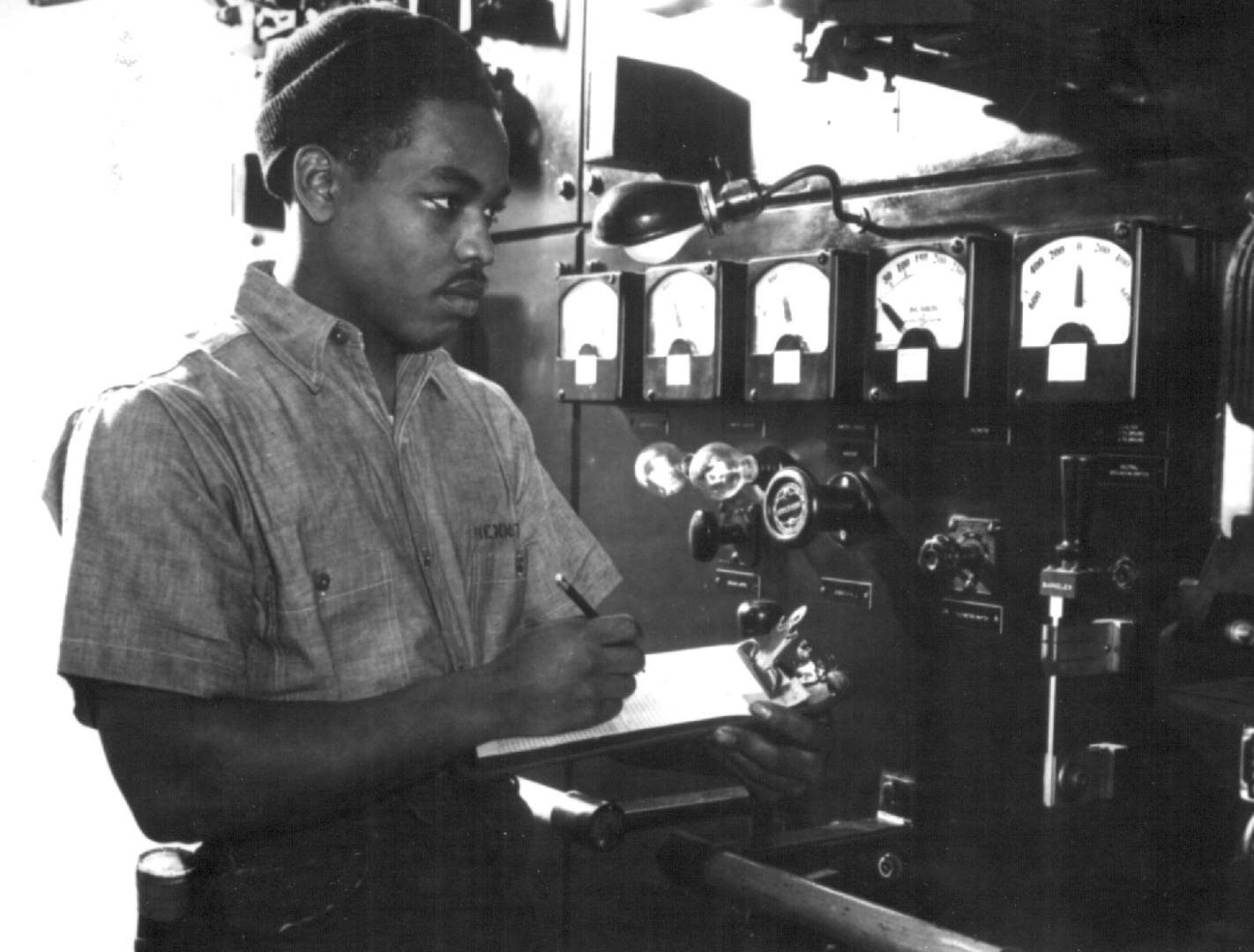
Enlarge
Original Caption: A seaman with the U.S. Maritime Service. Local Identifier: 208-NP-3ZZ-4, National Archives Identifier: 535819.
View in National Archives Catalog
132. Two U.S. Maritime Service seamen in front of a 4th War Loan poster. N.d. National Archives Identifier: 535818, Local Identifier: 208-NP-3ZZ-3.
133. “Artist George Wright, an American merchant seaman, presents to Russian Captain Orset Chevstov a painting depicting a Soviet woman war worker and an American seaman unloading a U.S. Lend-Lease tank at a Soviet port…” August 18, 1944. Wide World Photos. National Archives Identifier: 535787, Local Identifier: 208-N-31563.
134. A mariner in the U.S. Maritime Service. N.d. National Archives Identifier: 535817, Local Identifier: 208-NP-3ZZ-2.
135. “Lt.(jg.) Stanly Marlowe Smith, U.S. Maritime Service; [Mrs. Marion H. Elliott] Assistant Executive Secretary of the National Council of Negro Women; and Mrs. B.L. Derrick, Chairman.” Lt. Smith is pictured at a war bond rally in Washington, DC, where he spoke and was honored. August 8, 1944. National Archives Identifier: 542396, Local Identifier: 357-G-83-4308.
136. “… Clifford R. Jenkins, Jr… After a course at the Cooks and Bakers School at the U.S. Maritime Training Base, Sheepshead Bay, Brooklyn [NY],…is now baking for merchant seamen aboard the [SS] Patrick Henry, first Liberty Ship launched.” N.d. National Archives Identifier: 542398, Local Identifier: 357-G-93-548.
137. “Capt. Clifton Lastic, Master of Liberty Ship [SS] Bert Williams chats with Joe Curran, President of N.M.U. [National Maritime Union].” The SS Bert Williams is named for an African-American comedian. N.d. National Archives Identifier: 542397, Local Identifier: 357-G-86-510.
138. “Aboard a Victory ship en route to the Pacific war zone, Chief Mate Earl Stanfield coaches Bos’n Maxie Weisbarth (with whiskers) in mysteries of navigation.” N.d. National Archives Identifier: 542399, Local Identifier: 357-G-98-5728.
139. “Arnold R. Fesser, oiler, 17 years at sea: `We got a big job to do until this war is won. We will keep them sailing until the end. Then we have got time for holidays.” October 14, 1944. National Archives Identifier: 542400, Local Identifier: 357-G-203-4690.
140. The launching party for the SS Harriet Tubman. June 3, 944.Guy Nicholas. National Archives Identifier: 535828, Local Identifier: 208-NP-5E-3.
Women in the Military
141. “U.S. Army nurses, newly arrived, line the rail of their vessel as it pulls into port of Greenock, Scotland, in European Theater of Operations. They wait to disembark as the gangplank is lowered to the dock.” August 15, 1944. Meyer. National Archives Identifier: 531204, Local Identifier: 111-SC-192605-S.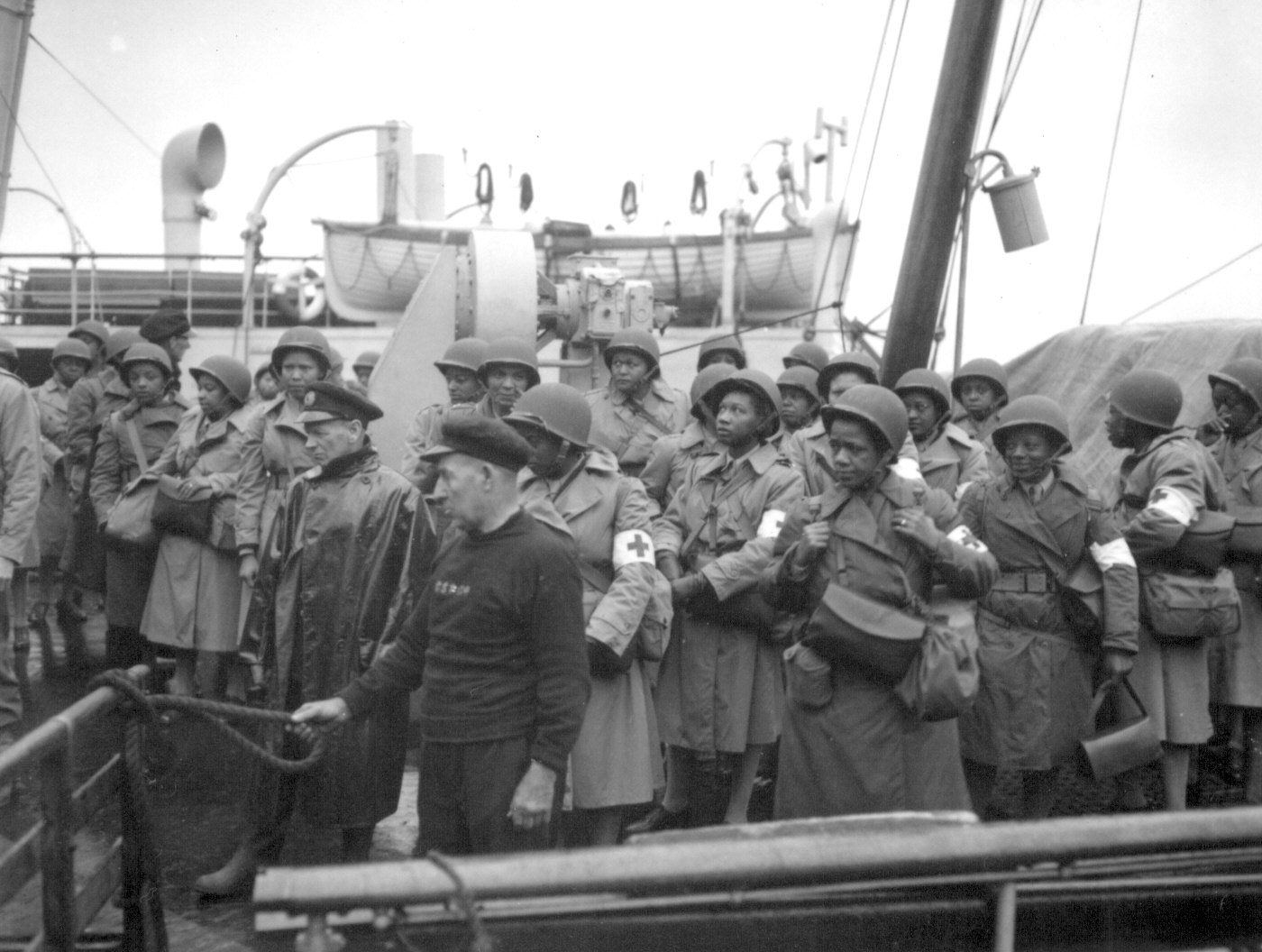
Enlarge
Original Caption: “U.S. Army nurses, newly arrived, line the rail of their vessel as it pulls into port of Greenock, Scotland, in European Theater of Operations. They wait to disembark as the gangplank is lowered to the dock.” Local Identifier: 111-SC-192605-S, National Archives Identifier: 531204.
View in National Archives Catalog
142. “Surgical ward treatment at the 268th Station Hospital, Base A, Milne Bay, New Guinea. Left to right: Sgt. Lawrence McKreever, patient; 2nd Lt. Prudence Burns, ward nurse; 2nd Lt. Elcena Townscent, chief surgical nurse; and an unidentified nurse.” June 22, 1944. Pfc. Michael Pitcairn. National Archives Identifier: 530771, Local Identifier: 111-SC-287482.
143. “Pfc. Johnnie Mae Welton, Negro WAC, laboratory technician trainee, conducts an experiment in the serology laboratory sf the Fort Jackson Station Hospital, Fort Jackson, SC.” March 20, 1944.Jensen. National Archives Identifier: 531360, Local Identifier: 111-SC-341534.
144. “WAACs at work in Temp. Bldg. `M’, 26th Street, Washington, DC, WAAC Headquarters. Left to right: Lts. Harriet West and Irma Cayton,…going over their recruiting schedule report.” 1942.Wilfred Morgan. National Archives Identifier: 531139, Local Identifier: 111-SC-144958.
145. “Auxiliaries Ruth Wade and Lucille Mayo (left to right) further demonstrate their ability to service trucks as taught them during the processing period at Fort Des Moines and put into practice at Fort Huachuca, Arizona.” December 8, 1942. Oster. National Archives Identifier: 531153, Local Identifier: 111-SC-162466.
146. “… WAAC cooks prepare dinner for the first time in new kitchen at Fort Huachuca, Arizona.” December 5, 1942.Oster. National Archives Identifier: 531152, Local Identifier: 111-SC-162454.
147. “Capt. Della H. Raney, Army Nurse Corps, who now heads the nursing staff at the station hospital at Camp Beale, CA, has the distinction of being the first Negro nurse to report to yuty in the present war…” April 11, 1945. National Archives Identifier: 535942, Local Identifier: 208-PU-161K-1.
148. “The first Negro WACs to arrive [on] the continent of Europe were 800 girls of the 6888th Central Postal Directory Bn, who had also been the first to arrive in England. After the battalion had set up its facilities at Rouen, France, it held an `open house’, which was attended by hundreds of Negro soldiers. Pvt. Ruth L. James,…of the battalion area is on duty at the gate.” May 26, 1945.Pfc. Stedman. National Archives Identifier: 531333, Local Identifier: 111-SC-237072.
149. “Somewhere in England, Maj. Charity E. Adams,…and Capt. Abbie N. Campbell,…inspect the first contingent of Negro members of the Women’s Army Corps assigned to overseas service.” 6888th Central Postal Directory Bn. February 15, 1945. Holt. National Archives Identifier: 531249, Local Identifier: 111-SC-200791.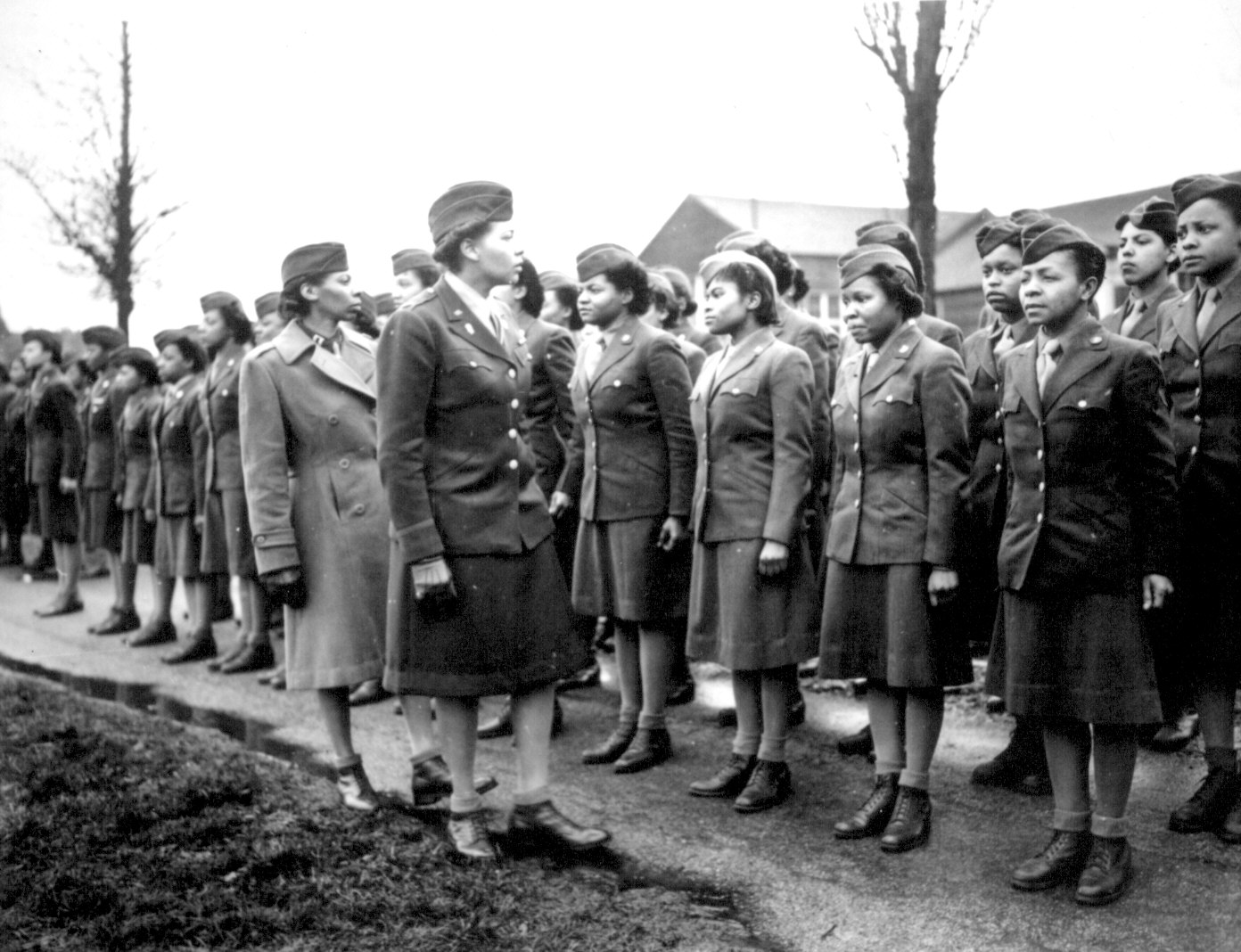
Enlarge
Original Caption: Somewhere in England, Maj. Charity E. Adams,…and Capt. Abbie N. Campbell,…inspect the first contingent of Negro members of the Women’s Army Corps assigned to overseas service. Local Identifier: 111-SC-200791, National Archives Identifier: 531249.
View in National Archives Catalog
150. “Members of the 6888th Central Postal Directory Battalion take part in a parade ceremony in honor of Joan d’Arc at the marketplace where she was burned at the stake.” May 27, 1945.Pfc. Stedman. National Archives Identifier: 531431 & 175539237, Local Identifier: 111-SC-426441.
151. “The `Top-Kick’ looks them over at Camp Shanks, New York, Transportation Corps staging area of the New York Port of Embarkation. Tech. Sgt. Tommye Berry, Acting 1st Sgt. of the Negro WAC group…” April 16, 1945. National Archives Identifier: 535929, Local Identifier: 208-PU-10D-7.
152. “Lt. Florie E. Gant…tends a patient at a prisoner-of war hospital somewhere in England.” October 7, 1944. National Archives Identifier: 531495, Local Identifier: 112-SGA-Nurses-44-1676.
153. “A company of Negro WAACs was reviewed by the Hon. Lester A. Walton, U.S. Minister to Liberia, recently on a visit to an American camp near Monrovia [Liberia]. The WAACs are shown as they lined up for review.” N.d. National Archives Identifier: 535837, Local Identifier: 208-NP-6KKK-5.
154. “Willa Beatrice Brown, a 31-year-old Negro American, serves her country by training pilots for the U.S. Army Air Forces. She is the first Negro woman to receive a commission as a lieutenant in the U.S. Civil Air Patrol.” N.d. National Archives Identifier: 535717, Local Identifier: 208-FS-793-1.
155. “Two Negro SPARS pause on the ladder of the dry-land ship `U.S.S. Neversail’ during their `boot’ training at the U.S. Coast Guard Training Station, Manhattan Beach, Brooklyn, NY. They are recent enlistees and have the ratings of apprentice seamen. In front is SPAR Olivia Hooker and behind her is SPAR Aileen Anita Cooks.” N.d. National Archives Identifier: 535869, Local Identifier: 208-NP-10K-1.
156. “Inspecting a Grumman Wildcat engine on display at the U.S. Naval Training School (WR) Bronx, NY, where she is a `boot’ is WAVE Apprentice Seaman Frances Bates.” 1945. National Archives Identifier: 520638, Local Identifier: 80-G-183373.
157. “Hospital Apprentices second class Ruth C. Isaacs, Katherine Horton and Inez Patterson (left to right) are the first Negro WAVES to enter the Hospital Corps School at National Naval Medical Center, Bethesda, MD.” March 2, 1945. National Archives Identifier: 520634, Local Identifier: 80-G-126506.
158. “Cmdr. Thomas A. Gaylord, USN (Ret’d), administers oath to five new Navy nurses commissioned in New York…” Phyllis Mae Dailey, the Navy’s first African-American nurse, is second from the right. March 8, 1945. National Archives Identifier: 520618, Local Identifier: 80-G-48365.
159. “Lt.(jg.) Harriet Ida Pickens and Ens. Frances Wills, first Negro Waves to be commissioned. They were members of the final graduating class at Naval Reserve Midshipmen’s School (WR) Northampton, MA.” December 21, 1944.Cropped view. National Archives Identifier: 520670, Local Identifier: 80-G-297441.
Training
160. “Sixteen Negro soldiers recently won the coveted `wings’ of the U.S. Army paratroopers at Fort Benning, in the southern U.S. state of Georgia. The picture shows some of them riding high in a C-47 transport plane preparing to make one of the required five qualifying jumps.” March 1944. National Archives Identifier: 535719, Local Identifier: 208-FS-1783-1.
161. “Just after stepping out of Ft. Benning [GA] Theater No. 4 at the conclusion of the 16th O.C.S. graduating exercises, 2nd Lts. Henry C. Harris, Jr.; Frank Frederick Doughton; Elmer B. Kountze; and Rogers H. Beardon (behind) start pinning their brass bars on each others shoulders.” May 29, 1942. Golz. National Archives Identifier: 531137, Local Identifier: 111-SC-137679.
162. “Lt. B. Holmes instructing cadres in the art of parry and long thrust in bayonet practice. Left to right: T/Sgt. Leroy Smith, Pvt. George W. Jones, and Sgt. Leo Shorty, look on.” 92d Division, Fort McClellan, AL. November 1942. National Archives Identifier: 531140, Local Identifier: 111-SC-147979.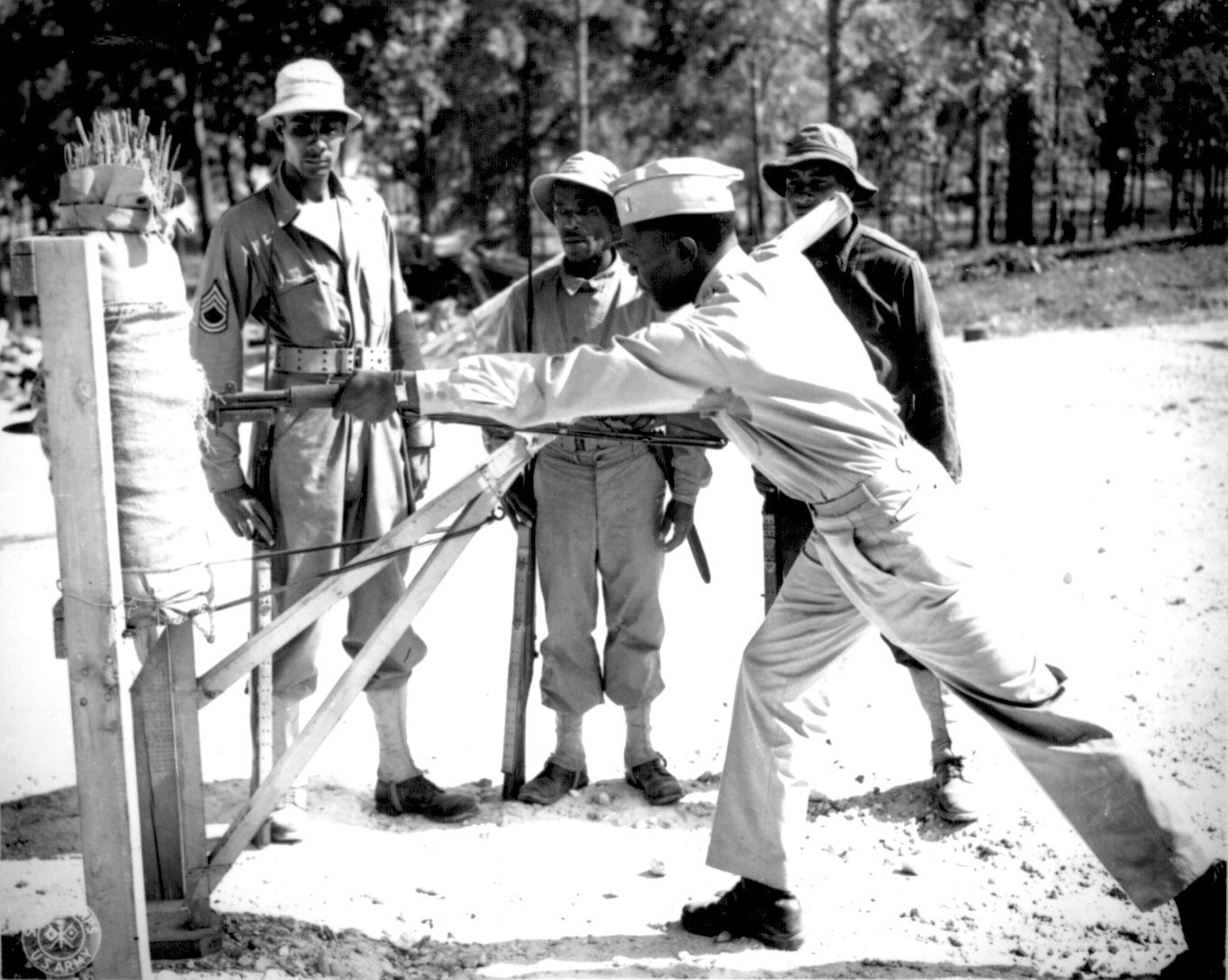
Enlarge
Original Caption: “Lt. B. Holmes instructing cadres in the art of parry and long thrust in bayonet practice. Left to right: T/Sgt. Leroy Smith, Pvt. George W. Jones, and Sgt. Leo Shorty, look on.” Local Identifier: 111-SC-147979, National Archives Identifier: 531140.
View in National Archives Catalog
163. “A squad of non-coms, cadres of the 92nd Division, get a refresher course in charging through smoke. When the main body of troops arrives it will be up to the cadres to train them.” Fort McClellan, AL. November 1942. National Archives Identifier: 531141, Local Identifier: 111-SC-147998.
164. “Men of the Sixteenth Battalion, crack all-Negro training unit at the Field Artillery Replacement Center, Fort Bragg, NC, are shown in their daily rifle calisthenics. After nine weeks training the men have developed a rhythm and precision in these body building exercises that is seldom equalled by more experienced troops.” February 1943. National Archives Identifier: 531155, Local Identifier: 111-SC-166875.
165. “Address of welcome to [Army Air Corps] cadets in front of Booker T. Washington Monument on the grounds of Tuskegee Institute.” Tuskegee, AL. August 1941. National Archives Identifier: 531132, Local Identifier: 111-SC-122432.
166. “[Army Air Corps] cadets reporting to Captain B[enjamin] O. Davis, Jr. commandant of cadets.” Tuskegee Field, AL. September 1941. National Archives Identifier: 531133, Local Identifier: 111-SC-122434.
167. “Officer returns salute as he passes the cadets lined up during review.” Tuskegee Field, AL. N.d. National Archives Identifier: 535831, Local Identifier: 208-NP-5QQ-6.
168. “Basic and advanced flying school for Negro Air Corps cadets, Tuskegee, Alabama… In the center is Capt. Roy F. Morse, Air Corps… He is teaching the cadets how to send and receive code.” On the left, from front to rear: James B. Knighten, Lee Rayford, and C. H. Flowers. On the right, from front to rear: George Levi Knox, Sherman W. White, and Mac Ross. January 1942. Wilfred Morgan. National Archives Identifier: 535830, Local Identifier: 208-NP-5QQ-3.
169. “Pilots at Selfridge Field [MI] learn to carry out bombing missions as they would carry them out under actual combat conditions. These pilots are being briefed for a practice raid.” Ca. 1943. National Archives Identifier: 535963, Local Identifier: 208-VM-1-5-68A.
170. “Negro pilots in one of the flight formations which will soon carry them over enemy territory. Here they are flying the shark-nosed P-40 fighter aircraft.” Selfridge Field, MI. Ca. 1943. National Archives Identifier: 535964, Local Identifier: 208-VM-1-5-69G.
171. “Negro recruits at Manhattan Beach Training Station, [NY].” N.d. National Archives Identifier: 513165, Local Identifier: 26-G-142-2114.
172. “… George C. Fields, 32, points proudly to the honor certificate presented him yesterday at graduation exercises for the tenth Negro class to be graduated from the Navy’s Service Schools at the U.S. Naval Training Station, Great Lakes, IL. Fields served as President Roosevelt’s valet for four years before entering the Navy.” Ca. 1943. National Archives Identifier: 535847, Local Identifier: 208-NP-7QQ-2.
173. “As a landing barge noses onto the beach, members of the Negro Seabee Battalion clamber ashore. This assault training is supplemental to the Seabees’ chief work as construction crews for the U.S. Navy.” Ca. December 1942. National Archives Identifier: 535776, Local Identifier: 208-N-570.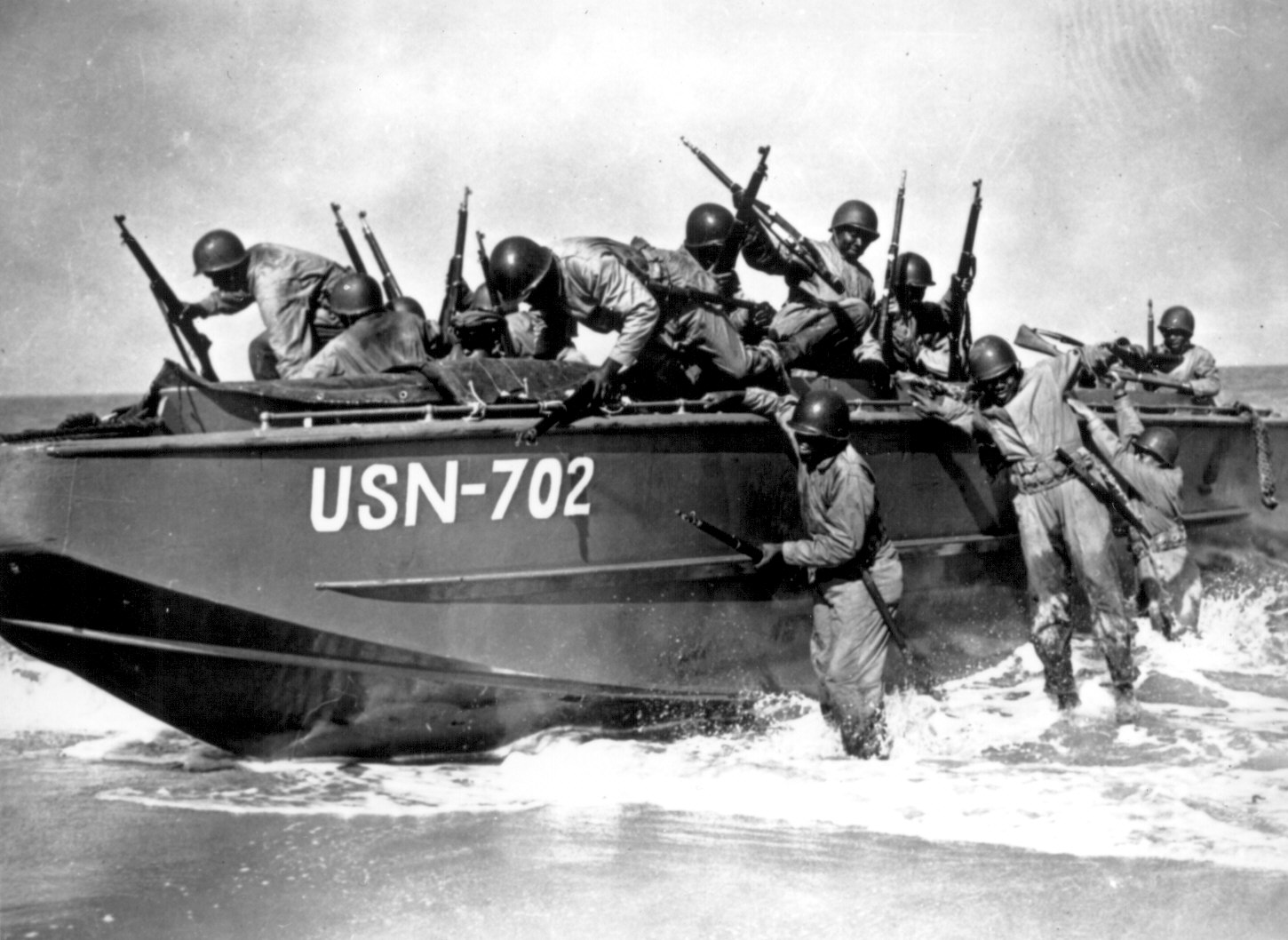
Enlarge
Original Caption: The Negro Seabees, members of Naval Construction Battalions, whose training center is at Camp Allen and Camp Bradford, near Norfolk, Virginia, are trained in landing tactics as well as in general military drill. Local Identifier: 208-N-5704, National Archives Identifier: 535776.
View in National Archives Catalog
174. “CQM L. J. Russell, USNR, teaching navigation to Charles W. Divers, QM2c; Royal H. Gooden, QM2c; Lewis F. Blanton, QM3c; Calvin Bell, QM2c at NTS Norfolk, VA. Their ship (now being constructed) will be U.S.S. Mason (DE 529).” January 3, 1944. National Archives Identifier: 520611, Local Identifier: 80-G-44828.
175. “Carlton J. Dearborn, S2c [cements a stringer on the fuselage of balsam model of Stuka Dive Bomber at Camp Smalls, U.S. Naval Training Station, Great Lakes, IL. Dearborn teaches sailors to identify enemy and Allied aircraft].” March 13, 1943. National Archives Identifier: 520667, Local Identifier: 80-G-294792.
176. “Steward’s Mates School at NAS Seattle, WA. Marching under the direction of Chief Steward Robert Nargrove.” April 1944. National Archives Identifier: 520647, Local Identifier: 80-G-233266.
177. “A platoon of Negro `boot recruits’ listen to their drill instructor [Sgt. Gilbert Hubert Johnson] whose job is to turn them into finished Marines.” Montford Point Camp, NC. Ca. April 1943. National Archives Identifier: 535866, Local Identifier: 208-NP-10FF-1.
178. “Judo instruction is one of the high spots in the life of the latest addition to the Leatherneck Marines here. An instructor shows a recruit how to make the enemy’s bayonet useless. Cpl. Arvin Lou Ghazlo, USMC, giving judo instructions to Pvt. Ernest C. Jones, USMCR.” Montford Point Camp, NC. April 1943. National Archives Identifier: 532513, Local Identifier: 127-N-5334.
179. “A trio of recruits in training to take their places as fighting Leathernecks in the U.S. Marine Corps, run the rugged obstacle course at Camp Lejeune, NC [Montford Point Camp]. The Marine recruits have shown such excellent results in their aptitudes and leadership capacities that an expanded Navy recruiting program is now underway.” April 1943. Pat Terry. National Archives Identifier: 532514, Local Identifier: 127-N-5335.
180. Two recruits in a light tank during training in mechanized warfare at Montford Point Camp, NC. April 1943. Pat Terry. National Archives Identifier: 532512, Local Identifier: 127-N-5320-B.
181. “Under the direction of Swimming Instructor, Marine Pfc. Paul Tolliver…, Leathernecks in training at Montford Point Camp learn the correct movements for the breaststroke.” November 1944. Anderson. National Archives Identifier: 532367, Local Identifier: 127-GC-404-8276.
182. “Marines receiving instruction in the Demolition Course at Montford Point Camp [NC], during intensive combat training in preparation for action in the Pacific.” February 1945. Sgt. L. A. Wilson. National Archives Identifier: 532516, Local Identifier: 127-N-9019.
183. “American Negro nurses, commissioned second lieutenants in the U.S. Army Nurses Corps, limber up their muscles in an early-morning workout during an advanced training course at a camp in Australia. The nurses, who already had extensive training in the U.S., will be assigned to Allied hospitals in advanced sectors of the southwest Pacific theater.” February 1944. National Archives Identifier: 535782, Local Identifier: 208-N-2296.
184. “WAAC Capt. Charity Adams of Columbia, NC, who was commissioned from the first officer candidate class, and the first of her group to receive a commission, drills her company on the drill ground at the first WAAC Training Center, Fort Des Moines, Iowa.” May 1943. National Archives Identifier: 531334, Local Identifier: 111-SC-238651.
185. “A Negro WAAC [Mrs. Mary K. Adair] takes an examination for Officers’ Candidate School, Fort McPherson, Georgia.” June 20, 1942. National Archives Identifier: 531337, Local Identifier: 111-SC-25635.
186. “U.S. Army nurses are taking notes during a lecture in [a] classroom at the Army Nurse Training Center in England.” September 5, 1944. Klosterman. National Archives Identifier: 531411, Local Identifier: 111-SC-37076.
Rest and Relaxation
187. “A contingent of 15 nurses,…arrive in the southwest Pacific area, received their first batch of home mail at their station.” 268th Station Hospital, Australia. Three of the nurses are Lts. Prudence L. Burns, Inez Holmes, and Birdie E. Brown. November 29, 1943. Sgt. Dick D. Williams. National Archives Identifier: 531410, Local Identifier: 111-SC-370740.
188. “The Bowling Alleys at Fort McClellan, Alabama, are well patronized by members of WAC Det #2 in their off-duty hours. M/Sgt Helen Starr…is ready to send a ball on its way down the alley.” January 27, 1944. National Archives Identifier: 531173, Local Identifier: 111-SC-18369.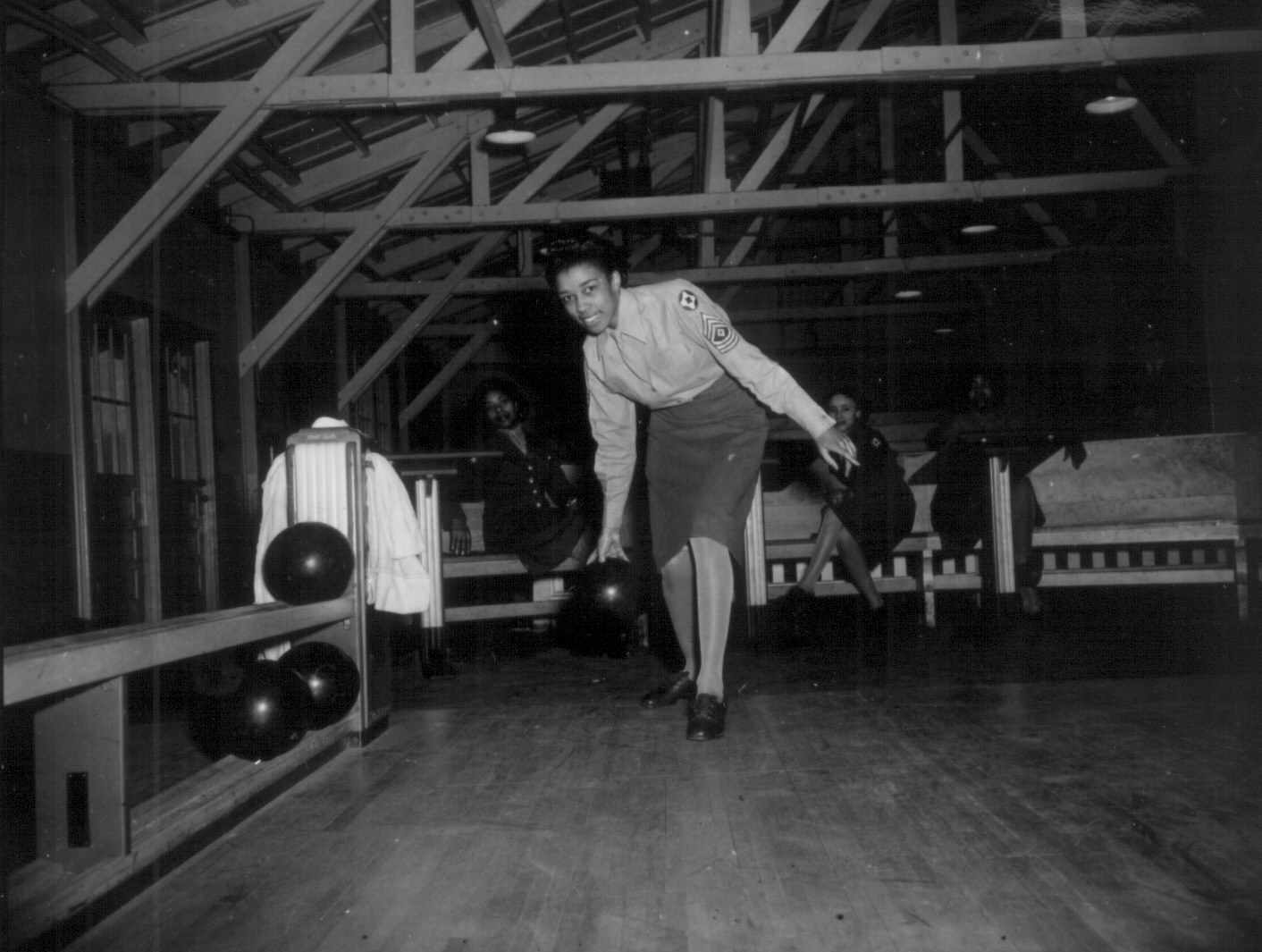
Enlarge
Original Caption: “The Bowling Alleys at Fort McClellan, Alabama, are well patronized by members of WAC Det #2 in their off-duty hours. M/Sgt Helen Starr…is ready to send a ball on its way down the alley.” Local Identifier: 111-SC-183691, National Archives Identifier: 531173.
View in National Archives Catalog
189. “WAAC officers go shopping…soon after their arrival at Fort Huachuca, Arizona, these two officers [3d Officers Vera Harrison and Irma J. Cayton] started shopping for lamps and other accessories needed in their recreation hall.” 1942. Oster. National Archives Identifier: 531154, Local Identifier: 111-SC-16248.
190. “Send `em V-Mail and keep `em smiling.” N.d. National Archives Identifier: 535851, Local Identifier: 208-NP-8AAA-1.
191. “… U.S. Coast Guardsmen make use of a telephone booth in Scotland. They are on liberty from their ship, a Coast Guard combat cutter engaged in convoy escort duty.” From left to right: Officers’ Cook Second Class Joseph Andy, Officers’ Steward First Class Casiano Aquino, Gunner’s Mate Second Class Vincent G. Igoe, Electrician’s Mate Second Class George Trigony, Radioman Third Class Carlton Lee, and Officers’ Steward Second Class Daniel Riley. N.d. National Archives Identifier: 513167, Local Identifier: 26-G-1550.
192. “Relaxing aboard a U.S. Coast Guard-manned transport headed for Pacific invasion areas, three Negro Marines catch a smoke. Tomorrow, it will be the smoke of battle.” N.d. National Archives Identifier: 513196, Local Identifier: 26-G-321.
193. “Aboard a U.S. Coast Guard-manned transport somewhere in the Pacific, a group of Negro Marines presents a cheerful front.” N.d. National Archives Identifier: 513198, Local Identifier: 26-G-322.
194. “Negro boxing champions at Great Lakes, IL.” U.S. Naval Training Station. March 3, 1943. National Archives Identifier: 520668, Local Identifier: 80-G-29485.
195. “However pressing his duties STM2/c James Lee Frazer always finds time to read a few chapters from his Bible each day. In this study he is especially intense about his devotional routine…it was the night before the opening strike of a raid on Manila Bay.” January 9, 1945. National Archives Identifier: 520675, Local Identifier: 80-G-30524.
196. “34th CB’s trading with natives from Malaita. Left to right: native; Percy J. Hope, MS2c; Lilton T. Walker, S1c; two natives; Jack Kelsen, SC1c.” Halavo, Florida Island, Solomon Islands. September 23, 1943. National Archives Identifier: 520630, Local Identifier: 80-G-8916.
197. “Somewhere in England one of the hottest bands in the European Theater of Operations belongs to a Special United States Naval Construction Battalion…” The band leader and trumpeter is Coxswain Thomas J. Lindsey (left), and the drummer is S1c. Edward A. Grant. December 14, 1944. National Archives Identifier: 535858, Local Identifier: 208-NP-8T-2.
198. “… sailors in their bunkroom aboard the U.S.S. Ticonderoga (CV-14) on eve of the Battle of Manila, PI. Thomas L. Crenshaw (STM1/c) looks at a picture of his three children, while a bunkmate writes a letter home.” November 4, 1944. Lt. Wayne Miller. National Archives Identifier: 520867, Local Identifier: 80-G-46951.
199. Navy baseball team–Espiritu Santo, New Hebrides. September 1944. National Archives Identifier: 520633, Local Identifier: 80-G-12396.
200. “Negro troops, moving over the Atlantic on a Coast Guard manned troop transport, sprawl on a hatch to `bat the breeze’ and talk of home. They are on their way to the fighting lines in Europe…” N.d. National Archives Identifier: 535816, Local Identifier: 208-NP-3WW-22.
201. Soldiers listening to a jukebox. N.d. National Archives Identifier: 535751, Local Identifier: 208-LU-35CC-4.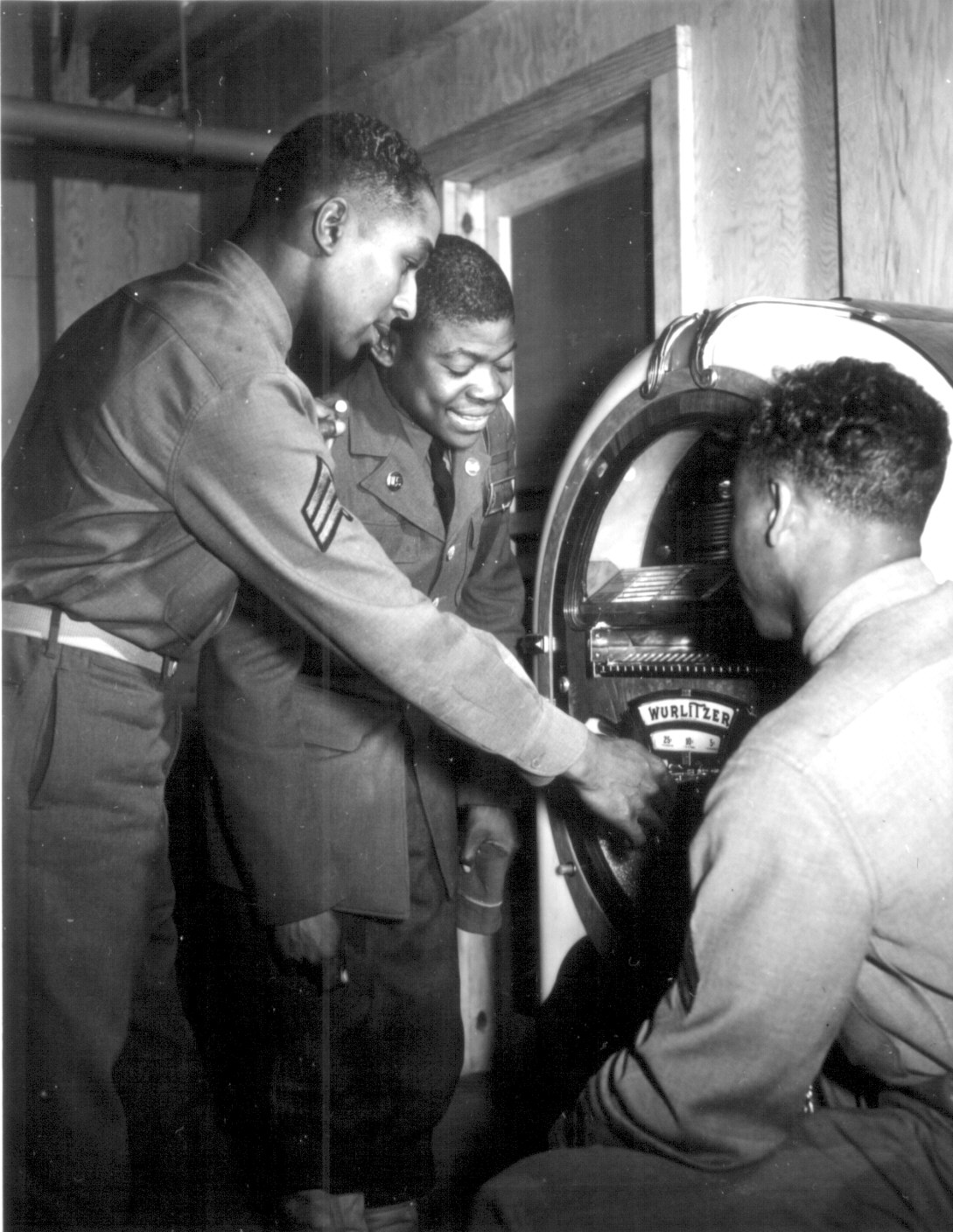
Enlarge
Original Caption: Soldiers listening to a jukebox. Local Identifier: 208-LU-35CC-4, National Archives Identifier: 535751.
View in National Archives Catalog
202. “Rickshaws are almost as common in India as they are in China. Some of the…troops are on their way to see `Tarzan’s New York Adventure’–in India…” July 1943. National Archives Identifier: 535539, Local Identifier: 208-AA-45HH-1.
203. “After a hard day’s work a shower and shave are in order. Sgt. Wm. H. Whaley…soaps himself before taking a cold shower while Sgt. Delos Oliver…lathers up…” Ca. July 1943. National Archives Identifier: 535538, Local Identifier: 208-AA-45BB-1.
204. “Negro GIs and American Red Cross workers, college graduates, join in some musical fun at Assam, India…” Left to right: Cpl. Robert Barttow, Pvt. James Montgomery, Jeannette C. Dorsey, and Willie Lee Johnson. August 23, 1944. Grigg. National Archives Identifier: 531351, Local Identifier: 111-SC-329741.
205. “Chaplain William T. Green reads the benediction at the marriage ceremony of Pfc. Florence A. Collins, a WAC of the 6888th Postal Directory Battalion, to Cpl. William A. Johnson of the 1696th Labor Supervision Co. This is the first Negro marriage to be performed in the European Theater of Operations.” Rouen, France. August 19, 1945. T/5 L. Kaufman. National Archives Identifier: 531314, Local Identifier: 111-SC-210939.
206. “Sgt. Franklin Williams, home on leave from army duty, with his best girl Ellen Hardin, splitting a soda. They met at Douglas High School.” Baltimore, MD. May 1942. Arthur Rothstein. National Archives Identifier: 535838, Local Identifier: 208-NP-6LL-11.
207. “Christmas Dance at Negro Service Club #3. The dance was sponsored by the 1323rd Engineers. They had their own orchestra. Camp Swift, Texas.” December 23, 1943. Pvt. Greene. National Archives Identifier: 531180, Local Identifier: 111-SC-188341.
208. “For his 19th birthday, this sergeant’s buddies baked him a cake and decorated it with the tools of his trade. P.S.: He didn’t light the candles.” Ca. May 1942. Fred Morgan. National Archives Identifier: 531143, Local Identifier: 111-SC-150930-B.
209. “Long, dangerous missions over enemy territory and inclement weather often necessitate fighter planes returning to their bases with gas in their tanks for little over 3 minutes flying time. Pilots of a 15th AAF squadron decided to form a club to be known as `The Three Minute Egg Club’, with membership limited to those unfortunates who landed within the narrow margin.” Left to right: 1st Lts. Clarence A. Dart and Wilson D. Eagelson and 2d Lt. William N. Olsbrook. N.d. National Archives Identifier: 535545, Local Identifier: 208-AA-47E-1.
210. “Negro [air cadet] shown on a cot in his barracks studying as he gazes fondly at his collection of photos of his girl friends.” N.d. National Archives Identifier: 535832, Local Identifier: 208-NP-5QQ-9.
211. “Pvt. Lloyd A. Taylor, 21-year-old transportation dispatcher at Mitchel Field, New York City, who knows Latin, Greek, Spanish, French, German, and Japanese, studies a book on Chinese. A former medical student at Temple University, he passes two hours a day studying languages as a hobby.” N.d. National Archives Identifier: 535873, Local Identifier: 208-NS-3753-2.
Personalities
212. “Dorothy Donegan, pianist, and Camp Robert Smalls swing band at NTS, Great Lakes.” June 16, 1943. National Archives Identifier: 520669, Local Identifier: 80-G-29490.
213. “Lester Granger, while inspecting facilities for Negro personnel at NAS, San Diego, CA, stops to chat with Rofes Herring, S1/c; Walter Calvert, S2/c; and Nollie H. Million, civilian employe[e], as Lt. Roper (left) stands by.” June 20, 1945. National Archives Identifier: 520687, Local Identifier: 80-G-33398.
214. “Marian Anderson, world’s greatest contralto, entertains a group of overseas veterans and WACs on [the] stage of the San Antonio Municipal Auditorium…” April 11, 1945. National Archives Identifier: 535928, Local Identifier: 208-PU-5A-3.
215. “Bishop John Andrew Gregg, Leader of [the] African Methodist Church in North Central United States and Envoy of President Roosevelt, fondles a pet koala bear adopted by Pfc. Sammy Hurt… Around the Bishop are members of the [630th] Ordnance Company.” July 21, 1943. National Archives Identifier: 531169, Local Identifier: 111-SC-180917.
216. “Hattie McDaniel (center), Chairman of the Negro Division of the Hollywood Victory Committee, takes time off from rehearsals…to lead a caravan of entertainers and hostesses to Minter Field,…for a vaudeville performance and dance for soldiers stationed there. The young lady to the right of Miss McDaniel is Miss Virginia Paris, noted concert singer.” N.d. National Archives Identifier: 535875, Local Identifier: 208-NS-4264-5.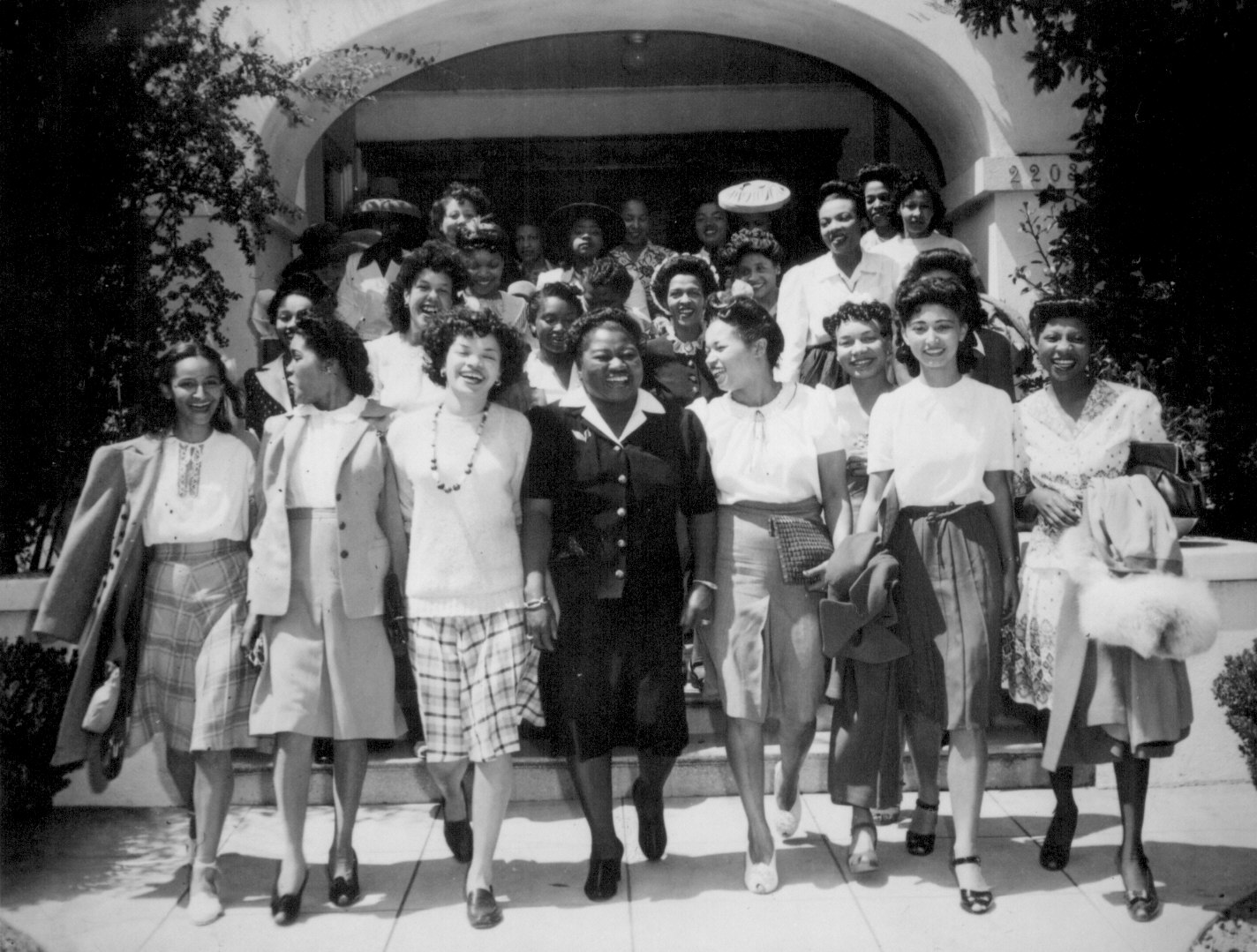
Enlarge
Original Caption: Hattie McDaniel (center), Chairman of the Negro Division of the Hollywood Victory Committee, takes time off from rehearsals…to lead a caravan of entertainers and hostesses to Minter Field,…for a vaudeville performance and dance for soldiers stationed there. Local Identifier: 208-NS-4264-5, National Archives Identifier: 535875.
View in National Archives Catalog
217. “Brig. Gen. Benjamin O. Davis watches a Signal Corps crew erecting poles, somewhere in France.” August 8, 1944. Cunningham. National Archives Identifier: 531201, Local Identifier: 111-SC-192258-S.
218. “Capt. Benjamin Oliver Davis, Jr., of Washington, D.C., climbing into an Advanced Trainer. Tuskegee, Alabama.” January 1942. Wilfred Morgan. National Archives Identifier: 535718, Local Identifier: 208-FS-872-3.
219. “Lena Horne conserves fuel (gas).” N.d. Randt Studios, Inc. National Archives Identifier: 535820, Local Identifier: 208-NP-4CCC-1.
220.”War Correspondent Ted Stanford of The Pittsburgh Courier, a weekly, interviews 1st Sgt. Morris O. Harris,…a tankman of the 784th Tank Battalion operating with the Ninth Army.” March 28, 1945. National Archives Identifier: 535535, Local Identifier: 208-AA-32P-14.
221. “After receiving first aid treatment in practice raid in Washington, DC, air-raid `victim’ is removed to hospital by a Medical Corps of the Office of Civilian Defense.” The physician is Dr. Charles Drew. N.d. Roger Smith. National Archives Identifier: 535826, Local Identifier: 208-NP-4W-2.
222. “First of the famous Mills Brothers quartet to enter Army service, Pvt. Harry Mills stops at the jukebox in the Reception Center PX to hear how he sounds on one of the latest Mills Brothers recordings. Left to right: S/Sgt. Arthur Whyte, Sgt. Robert Seymour, Pfc. George Blair, and Pvt. Harry Mills. Fort Custer, MI.” 1943 National Archives Identifier: 531178, Local Identifier: 111-SC-187426.
223. “Miss Josephine Baker, popular stage performer, sings the National Anthem as the finale to the show held in the Municipal Theater, Oran, Algeria, N. Africa. The band is directed by T/Sgt. Frank W. Weiss.” May 17, 1943. National Archives Identifier: 531160, Local Identifier: 111-SC-175237.
224. [Mary McLeod Bethune], “Mrs. Eleanor Roosevelt and others at the opening of Midway Hall, one of two residence halls built by the Public Buildings Administration of FWA for Negro government girls…” Washington, DC. May 1943. James Stephen Wright. National Archives Identifier: 533032, Local Identifier: 162-PBA-10-F-561.
225. “Sgt. Romare Bearden, noted young Negro artist whose paintings have been exhibited in galleries and museums in several metropolitan centers…is shown (right) discussing one of his paintings, `Cotton Workers,’ with Pvt. Charles H. Alston, his first art teacher and cousin… Both Bearden and Alston are members of the 372nd Infantry Regiment stationed in New York City.” Ca. February 1944. Roger Smith. National Archives Identifier: 535841, Local Identifier: 208-NP-6W-1.
226. Theodore R. Poston, head of the Negro Press Section, Office of War Information. N.d. National Archives Identifier: 535824, Local Identifier: 208-NP-4MMM-1.
227. “Mr. Truman K. Gibson, Jr., Civilian Aide to the Secretary of War, pictured at press conference Monday, April 9, following his return from Mediterranean and European Theaters of Operations.” April 9, 1945. National Archives Identifier: 535930, Local Identifier: 208-PU-77F-5.
228. “After inspecting a regiment of Negro artillerymen during a visit to Hawaii, Under Secretary of War Robert P. Patterson congratulates Col. Chauncey M. Hooper,…commander of the unit, while Lt. Gen. Robert C. Richardson, Jr. and Col. Harry B. Reubel,…watch with approval.” August 1943. National Archives Identifier: 524377, Local Identifier: 107-T-7-2.
229. Judge William H. Hastie, dean of the Howard University Law School, Civilian Aide to the Secretary of War. Ca. 1941. National Archives Identifier: 535835, Local Identifier: 208-NP-6BBB-1.
230. “Earl `Father’ [Fatha] Hines, a great swing musician, is shown with Pvt. Charles Carpenter, former manager of the Hines orchestra…” Camp Lee, VA. N.d. National Archives Identifier: 535834, Local Identifier: 208-NP-5XX-9.
231. “Surrounded by recruits, Marva Louis, wife of champion Joe [Louis], takes time out from a tour of nightclubs to entertain men in the Negro regiments at the U.S. Naval Training Station, Great Lakes, IL. Some 2,000 bluejackets gathered in a regimental drill hall to hear her songs.” N.d. National Archives Identifier: 535855, Local Identifier: 208-NP-8J-2.
232. “World Heavyweight champ Joe Louis (Barrow) sews on the stripes of a technical sergeant–to which he has been promoted…” April 10, 1945. National Archives Identifier: 535937, Local Identifier: 208-PU-120V-12.
233. “Paul Robeson, world famous Negro baritone, leading Moore Shipyard [Oakland, CA] workers in singing the Star Spangled Banner, here at their lunch hour recently, after he told them: `This is a serious job–winning this war against fascists. We have to be together.’ Robeson himself was a shipyard worker in World War I.” September 1942. Wide World Photos. National Archives Identifier: 535874, Local Identifier: 208-NS-3848-2.
234. “Admiral C. W. Nimitz, CinCPac, pins Navy Cross on Doris Miller, at ceremony on board warship in Pearl Harbor, T. H.” May 27, 1942. National Archives Identifier: 535857, Local Identifier: 208-NP-8PP-2.
The Homefront
235. “Brig. Gen. Robert N. Young, Commanding General of the Military District of Washington, assists Melba Rose, aged 2, daughter of Mrs. Rosie L. Madison,…in viewing the Silver Star posthumously awarded her father 1st Lt. John W. Madison, of the 92nd Infantry Division, who was killed in action in Italy…” N.d. National Archives Identifier: 535559, Local Identifier: 208-AA-139B-1.
236. “The National Council of Negro Women entertained British war workers representing labor unions and American labor women just returned from an eight-week tour of Great Britain…” April 21, 1945. National Archives Identifier: 535812, Local Identifier: 208-NP-3AA-1.
237. “LSM Vessel No. 325 launching party.” Mrs. Lula Martin, Chicago, IL, second from the left, was the sponsor. August 25, 1944. National Archives Identifier: 513046, Local Identifier: 19-N-7058.
238. “To learn how to shop with point stamps, these youngsters in a Fairfax County, Virginia, grade school have set up a play store, complete with point value table and informational material on point rationing.” N.d. Roger Smith. National Archives Identifier: 535821, Local Identifier: 208-NP-4FFF-1.
Enlarge
Original Caption: “To learn how to shop with point stamps, these youngsters in a Fairfax County, Virginia, grade school have set up a play store, complete with point value table and informational material on point rationing.” Local Identifier: 208-NP-4FFF-1, National Archives Identifier: 535821.
View in National Archives Catalog
239. “Air raid wardens at a sector meeting in Washington, DC, discuss the zones they control during a practice air raid.” N.d. Roger Smith. National Archives Identifier: 535827, Local Identifier: 208-NP-4W-3.
240. “V” home campaign, Washington, DC. October 1942. National Archives Identifier: 533827, Local Identifier: 171-OCD-140.
241. “Cardozo High School, Washington, DC.” High School Victory Corps. June 1943. Bonn. National Archives Identifier: 512754, Local Identifier: 12-E-41-398.
242. “William R. Carter, government pharmacist for 40 years… As [a] laboratory aide in the Food and Drug Administration of the Federal Security Agency, he is entrusted with the job of preparing media for testing the sterility of bandage material.” N.d. Roger Smith. National Archives Identifier: 535823, Local Identifier: 208-NP-4JJ-1.
243. “Making model airplanes for U.S. Navy at the Armstrong Technical High School. Washington, DC.” March 1942. Marjory Collins. National Archives Identifier: 535814, Local Identifier: 208-NP-3KK-1.
244. “… the public school children of the South-Central District of Chicago purchased $263,148. 83 in war bonds and stamps…a huge check representing enough money for 125 jeeps, two pursuit planes and motorcycle was presented to Maj. C. Udell Turpin of the Illinois War Bond Sales staff.” N.d. National Archives Identifier: 535815, Local Identifier: 208-NP-3MM-1.
245. “This highly experienced Negro draftsman is one of many skilled technical Negro workers employed in speeding war production at a large eastern arsenal.” May 1942. Howard Liberman. National Archives Identifier: 535806, Local Identifier: 208-NP-2HH-1.
246. “Cortez W. Peters, World’s Champion Portable Typist, is shown with ten late model standard-size typewriters which he turned over to the Government to aid the drive for 600,000 machines for the Army and Navy.” November 1942. Danor. National Archives Identifier: 535804, Local Identifier: 208-NP-1V-1.
247. “Pin-up girls at NAS Seattle, Spring Formal Dance. Left to right: Jeanne McIver, Harriet Berry, Muriel Alberti, Nancy Grant, Maleina Bagley, and Matti Ethridge.” April 10, 1944. National Archives Identifier: 520646, Local Identifier: 80-G-23326.
248. “Final assembly of the pilot’s compartment is being made by these Negro workers in a large eastern aircraft factory. These youths went directly from a war training course to their jobs in this plant.” May 1942. Howard Liberman National Archives Identifier: 535810, Local Identifier: 208-NP-2VV-2.
249. “Insignia for military police are being turned out in an eastern quartermaster corps depot where this young worker has obtained war production employment.” May 1942. Howard Liberman. National Archives Identifier: 535807, Local Identifier: 208-NP-2HHH-1.
250. “Under the direction of Cecil M. Coles, NYA foreman, Miss Juanita E. Gray learns to operate a lathe machine at the Washington, DC, NYA War Production and Training Center. This former domestic worker is one of hundreds of Negro women trained at this center.” N.d. Roger Smith. National Archives Identifier: 535809, Local Identifier: 208-NP-2QQQQ-1.
251. “The Negro janitors of the plant maintenance department in North America’s Kansas City factory in V-formation as they start out on their daily tasks.” February 4, 1942. Carl Conley. National Archives Identifier: 535801, Local Identifier: 208-NP-1KK-1.
252. “… Welders Alivia Scott, Hattie Carpenter, and Flossie Burtos await an opportunity to weld their first piece of steel on the ship [SS George Washington Carver].” Kaiser Shipyards, Richmond, CA. Ca. 1943. E.F. Joseph. National Archives Identifier: 535800, Local Identifier: 208-NP-1HHH-5.
Enlarge
Original Caption: “… Welders Alivia Scott, Hattie Carpenter, and Flossie Burtos await an opportunity to weld their first piece of steel on the ship [SS George Washington Carver].” Local Identifier: 208-NP-1HHH-5, National Archives Identifier: 535800.
View in National Archives Catalog
253. “Bertha Stallworth, age 21, shown inspecting end of 40mm artillery cartridge case at Frankford Arsenal.” N.d. National Archives Identifier: 535805, Local Identifier: 208-NP-1WW-1.
254. “Miss Clara Camille Carroll…, contributes her bit to the war effort in her daily work. She is one of the thousands of Negro girls now filling clerical positions in the Nation’s Capital.” January 15, 1943. Roger Smith. National Archives Identifier: 535813, Local Identifier: 208-NP-3F-3.
255. “… women employed at Savannah Quartermaster Depot, Savannah, Georgia.” Ca. 1943. National Archives Identifier: 522887, Local Identifier: 86-WWT-67-6.
256. Howard Wilson operating the sewing machine in the C. & E. Shoe Shop at Fort Benning, Georgia, as he finishes off a pair of parachutists boots. July 1942. Mooney National Archives Identifier: 531138, Local Identifier: 111-SC-13770.
257. Mrs. Sam Crawford helps with tobacco harvesting on her husband’s farm in Maryland. Mrs. Crawford wears the Women’s Land Army uniform. October 8, 1943. Cooper. National Archives Identifier: 532819, Local Identifier: 145-AAA-272.
258. Keep us flying. Buy War Bonds. Color poster of a Tuskegee Airman (probably Lt. Robert W. Diez) by an unidentified artist. 1943. National Archives Identifier: 514823, Local Identifier: 44-PA-1217.
259. United We Win. Color poster featuring a photograph by Howard Liberman of integrated aircraft factory workers. 1943. ational Archives Identifier: 513820, Local Identifier: 44-PA-370.
260. Above and Beyond the Call of Duty. Color poster of Doris (Dorie) Miller by David Stone Martin. 1943. National Archives Identifier: 535886, Local Identifier: 208-PMP-68.
News
The “Red Zone” – Land Still Abandoned Due to the Dangers Left by the First World War
The “Red Zone” – Land Still Abandoned Due to the Dangers Left by the First World War In the aftermath of the First World War, large areas of northeast France were left in ruin. Years of constant siege warfare along…
Before Becoming a Big-Name Actor, Richard Todd was a Paratrooper Who Fought at Pegasus Bridge
Before Becoming a Big-Name Actor, Richard Todd was a Paratrooper Who Fought at Pegasus Bridge Photo Credit: 1. Sgt. Christie, No. 5 Army Film & Photographic Unit / Imperial War Museums / Wikimedia Commons / Public Domain 2. Silver Screen…
The Potsdam Giants: A Prussian Infantry Regiment Of Nothing But Very Tall Soldiers
The Potsdam Giants: A Prussian Infantry Regiment Of Nothing But Very Tall Soldiers Frederick William I inspecting his giant guards known as The Potsdam Giants, a Prussian infantry regiment No 6, composed of taller-than-average soldiers. Frederick William I of Prussia,…
Ellen DeGeneres cuts a very casual figure as she drives around in her Ferrari
Ellen DeGeneres cuts a very casual figure as she drives around Montecito in her Ferrari… while preparing to embark on her stand-up tour Ellen DeGeneres cut a very casual figure as she made her way around Montecito on Tuesday morning. The…
“I’m heavily tattooed and keep getting rejected for jobs – it’s not fair”
Heavily tattooed OnlyFans star, 23, with multiple piercings on her FACE slams TJ Maxx for rejecting her for a job – accusing retailer of unfairly judging her dramatic look A woman has accused TJ Maxx of rejecting her for a…
All 75 passengers killed in plane crash after pilot let his chirldren control the plane
Praying, turning the engine off by accident and letting KIDS play with the controls: The worst blunders made by pilots before a crash revealed Every time we board a plane, we put our lives in the hands of the pilot….
End of content
No more pages to load
